#because his son-in-law wants it for real estate development too
Explore tagged Tumblr posts
Text

So go ahead and tell me again how both parties are the same.
#fuck trump#I don't want to say I told you so#but everyone who knows how this orange turd thinks knew he'd do NOTHING to help Gaza in the long run#because his son-in-law wants it for real estate development too#this is not anti-semitism - Kushner is an asshole who happens to be Jewish he is not an asshole because he is Jewish
6 notes
·
View notes
Text
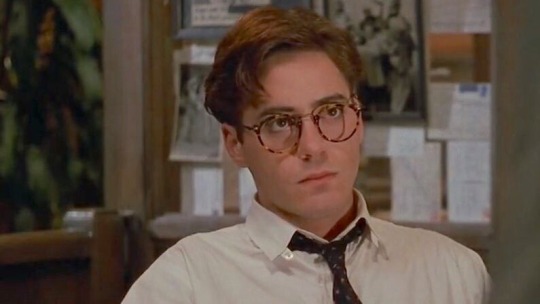
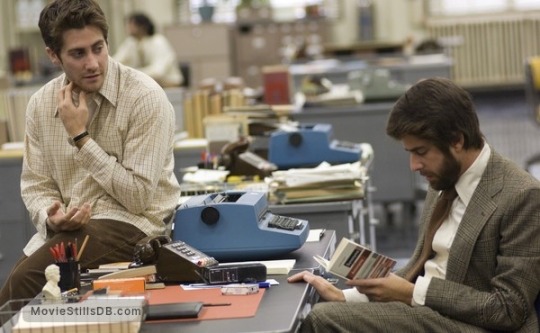
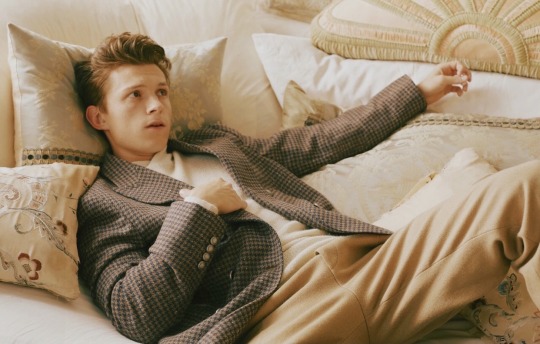
just think about them for a minute:
- i want peter parker, the new boy king of an organized crime unit ben has figureheaded for decades. the entire seaboard adores him - no one knows what's really paying the bills. as far as they know, real estate is booming again
- i want tony stark, our sweet young man from the city, taking after his father howard doing pro bono defense cases and helping the more unfortunate souls of new york
- i want quentin beck, disgraced reporter for the bugle, who is this fucking close to being fired if he won't stop going on and on about these old money families the entire city loves and actually find a credible story
- i want an angry quen beck, heart still aching and shattered, freshly broken up with, ready to spill every single secret about the parkers, and i want tony. poor, sweet, innocent tony, willing to walk right into the parker estate and practically announce that he's there for more evidence. and, because he's a total fucking moron, i want him to get caught.
- i want a peter that likes this little fly he's caught, this... tony stark. a peter that'll play with his food before he eats it. maybe he doesn't keep him - at least not locked in his basement or chained to the wall. but maybe he brings buck & steve over, whispers to them just loud enough for tony to hear. tells them to bring q to the house, however they had to.
- i want a peter that likes this little fly he's caught, this... tony stark. a peter that'll play with his food before he eats it. maybe he doesn't keep him - at least not locked in his basement or chained to the wall. but maybe he brings buck & steve over, whispers to them just loud enough for tony to hear. tells them to bring q to the house, however they had to.
- and maybe they sit tony down in front of quentin, not bound or restrained in anyway - just sitting in front of quentin and watching as peter forces q onto his knees and pulls the bag off his head. and tony .... doesn't want to run. this is just more evidence, right??? and peter is so content, inside, because he knows tony is just a tad bit too interested, and quentin beck is scared as fuck. because he knew he would get caught. he just didn't think it would be so soon.
- i want peter to sit next to tony as steve and bucky take turns whaling on quentin. i want tony watching, unwavering, as fists fly and blood runs. i want peter watching tony, eyes not leaving the man next to him, absolutely enraptured by his lack of fear. i want peter not at all concerned with the feeling in his gut as he watched tony's eyes get big when he sees quentin spit a bloody tooth out of his mouth. i want tony really fucking concerned by the total lack of fear and self preservation instincts he has within himself throughout the entire thing.
- i want him even more concerned when he doesn't even flinch, not when the two big buff guys are hitting quentin, not when peter stands up. not at all concerned when peter pulls a gun out from underneath his jacket. not when peter glances back at tony from over his shoulder, or when peter clicks the safety off and lines it up with quentin's right temple. not when peter shoots the little rat that got tony here in the first place, not when a fine spray of blood ends up all over his face. not when peter comes to kneel in front of him, safety still off and barrel still warm and gun resting right next to tony's dick what the fuck is this guy doing. not when peter snatches his own silk square from his breast pocket and wipes tony's face off, dabbing away the offensive red stains. not even when peter brings his lips up to tony's ear and whispers "i know you can keep quiet for me, can't you baby?".
- not when the gun is pulled away from his crotch and brought up to his hairline, tip of it dragged so gently from temple to chin. not when peter tips his head up so tony can fully face him, fully meet his eyes. i want the butterflies in tony's stomach when peter uses his loaded gun to force tony to his feet. i want them when peter uses his gun instead of his fingers to draw tony's lips toward his own. i want the catch in his throat when peter's unoccupied hand closes around it, when tony's forced into a box he didn't even know existed. i want the questionable sense of safety that wraps its way around him after the only first night he spends in peters bed. i want the security he feels when the blood is rinsed out of the clothes he wore that day - good as new, it never happened. i want the love he feels when peter buys him a ring - for his middle finger of course, a modestly sized titanium band, with an inscription on the inside
- i want the emptiness that he feels when peter tells him to never come back to the house. to never contact him again. that he can never come back. i want the tan line that develops around that ring - the feeling of distant ownership that comes with being peter parker's silent boy - i want the raised imprint on his skin - "quiet for me" - that's visible whenever he takes the ring off. he never takes the ring off. and maybe peter still helps fund howards tonys law firm, and helps make it possible for him to take all those pro bono cases and still eat regularly. and maybe he still keeps tony safe from the less desirable people seeking his services, that peter knows would look at or touch or think about him in ways that ,,, set peter's skin on fire. and maybe peter likes it. having his hands around the sweet defense lawyer boy from down the street, even if it's from afar. and maybe tony likes it too. likes keeping peters secrets. likes being his metaphorical kept boy. likes having the physical reminder on his finger that if he were ever to open his mouth, he would end up just like quentin.
- but maybe. maybe it isn't really enough for either of them. so maybe tony fucks up one day and asks to be seen. he knows he's not allowed to come back to the house. he knows he's not allowed to talk to peter again. but he has to. tony has to see him again. so he goes and he insists and that gets him a nice swift punch to the stomach - but he still gets to see peter. and peter waives everyone else away but tony, and they go, and they talk. they talk like lovers 50 years married. they talk like soulmates ripped from each others grasp. tony breaks down and says that he cant stay away. that he'll stay quiet for the rest of his life - that peter can do whatever he wants to him to make sure of it - but he can't just stay away. and peter's heart... it hurts. it aches for the man in front of him because he wants so desperately to keep him.
- and maybe... maybe tony stark, new york lawyer, 28, heir to the stark law firm, goes missing one day. maybe howard and maria are devastated and do everything in their power to find their son. maybe they wake up one morning to a loud knock on the door and an envelope sliding underneath. maybe they open it to a letter from their missing son and a check for $10,000,000. maybe they read a beautifully worded goodbye, a heartbroken apology for abandoning them, but assurance that he's okay. maybe tony spends his days in plush robes and silk shirts and $500 boxers. maybe he has a beautiful collection of collars and bracelets and rings and even crowns that his lover has bought him. maybe he enjoys it when peter comes in with a new circle of gold to wrap around his neck or finger or wrist or head. maybe he likes playing dress-up for his prince. and maybe, just maybe... peter likes spoiling the little fly he caught in his web. he likes putting gold and diamonds and gemstones all over this precious little catch
- because he loves his tony, and his tony loves him, and the best way to keep him quiet is to keep him close
inspiration: black treacle - arctic monkeys, suck it and see - arctic monkeys
i know the formatting on this sucks i don’t know how to fix it i’m sorry
#starker#.text#.mine#peter parker#tony stark#quentin beck#idk where this went or where it came from#i'm high#this took an hour ngl#oh well#hope u like it#gun violence#murder
112 notes
·
View notes
Note
destiel au fic recs?
Oh yes.
Once upon a time I made a post of every single one of my Fic Recs, and I’m especially fond of AUs, so I give you a list of just, solely, AU fics.
Let me start with my shameless self promotions. (They’re actually full of shame I’m sorry but those are my three AU fics I’ve written.
Alright, time for the real ones. *cracks knuckles* A Million Ways To Go by ChasingRabbits on AO3 - Castiel Novak is a preacher's son living in a world of black and white. Pragmatic and dutiful, he doesn't understand why anybody would want to make waves.Then the Winchesters move in down the street. Soon many of the skeletons in the Novak family's closet are exposed, and as the family faces them, Castiel begins to understand that there are many ways to see the world and so many more ways to live than what he's been told. - This is one of the few fics I’ve reread. The summary pretty much covers it, though, so I’ll let that one speak for itself.
Word Count: 91,079
https://archiveofourown.org/works/1086183/chapters/2185029
Smiling Out Of Fear by thepinupchemist on AO3- Castiel Novak is a product of the system, having gone through too many foster homes since the age of seven. At fourteen, he lands himself in Sugar Lane Mobile Home Community under the care of Missouri Moseley. There, he meets one Dean Winchester. A story about teenage hooligans, growing up, and finding a home. - Okay, I’m not going to say anything other than the fact that thinking about this fic literally makes me almost start crying happy tears. I adore it. (I pretty much recommend everything thepinupchemist has written, but I haven’t gotten through it all yet.)
Word Count: 117,494
https://archiveofourown.org/works/1007755/chapters/1998660 25¢ Pocket Guardian Angels by hopelessheathen on AO3- Dean walks into his local bank one day and notices that someone has filled the old gumball machine with these tiny, wiggling, sentient angels in individual plastic packaging. Deeply concerned about their air supply and the fact that they're trapped there in the sun, he starts pumping in quarters to rescue them. This is worse than leaving a dog in an overheating car. Now he's got forty of the little guys running all over his house, and god knows how many others might be trapped and dying all over the city. - I love this. I could read it three times a day and still get a smile on my face. It’s just a little one shot, but it’s worth the time it takes. Word Count: 13,325
https://archiveofourown.org/works/6359713
Burden by riseofthefallenone on AO3 - Mutants are considered second class citizens, or worse. Discriminated against at every turn, mutants are marked and monitored by The Registry and any deemed too dangerous are taken away to The Facility. It’s no surprise that many try to hide or choose a more permanent way out if a mutation develops. Castiel’s parents hid his mutation and hid him away from the world. He’s grown up with the knowledge that the world will hate him, no matter what he does. If he leaves the house, he can only do it with a long, heavy coat that covers the most beautiful part of him. It takes a pair of brothers to help him really spread his wings and live. - Yet another I adore. If you’ll keep a secret for me, I’m actually not caught up, but I oh so desperately want to be. I’m kind of a sucker for wings in general, though, so that helps.
Word Count: 317,582
https://archiveofourown.org/works/20613731/chapters/48945302
Out Of The Deep by riseofthefallenone on AO3 - Stay away from the light-beds. Stay in the deep. It is the first thing hatchlings are taught the moment their fans unfurl and they can swim without their parents to buoy them along. It is the first rule, the first law. It is the beginning of every boogey-monster bedtime story told when they settle against the cliffs to sleep. Castiel should have listened better. - Okay, but holy shit. This was one of the first Destiel fics I read, and it heightened my standards to unbelievable places. I adore it. I could write essays.
Word Count: 488,608
https://archiveofourown.org/works/548878/chapters/977676 True As It Can Be by whelvenwings - Growing up in a small town in Kansas, Dean learned from a young age that there was only one rule that couldn’t be broken, one place he couldn’t go - through the forest, to the long-abandoned Angel’s Hollow. But when Sam disappears, Dean’s left with no choice but to follow his brother's tracks through the dangers of the wood; little does he know that the most dangerous creature of all lurks not among the trees, but in the Hollow itself. Dean sets Sam free, at the cost of his own liberty - and, bound by magic, resigns himself to living out the rest of his days in the Hollow, at the mercy of the being within. The angel of Angel’s Hollow, however, has a story - is a prisoner, too, as much as Dean is. Only one thing can free them both - but it is impossible. For, after all: who could ever learn to love a beast? - This was the first, and last, Beauty and the Beast AU I ever read, but for good reason. I’m scared if I read another, that this one will absolutely shit on it and I won’t be able to enjoy it. I loved this fic very much.
Word Count: 71,952
https://archiveofourown.org/works/11048568/chapters/24631101
Okay, before I even mention the next one, please read the tags. There are quite a few possible triggers and the tags, luckily, have accurate trigger warnings. And, of course, archive warnings. (And, of course, be sure to read tags on the others.) If you have issues with that, just scroll past this one, because the others are fine. (I think/hope so. At least. If you have any issues, please, let me know. I’ll put warnings above those too)
Defiant by thestorygirl on AO3 - Dean Winchester has devoted his career as a police officer to helping angel slaves in any way that he can. He even formed and heads the "Angel Welfare Task Force," which involved him being called to consult on any case involving slaves. This passion stemmed from an incident that happened twenty years previously, when a thirteen year old Dean failed to help his friend Castiel escape being sold to a sadistic owner. Dean had never really harbored any hope of finding his friend. He saw his work as something he did in memory of Castiel, to prevent others from suffering the same fate. But, when called out on a routine case one day, Dean was startled to find that he recognized the victim. - So, usually I avoid the Non-Con archive warning at all. But with this one, honestly, I’m lucky I didn’t. I could seriously write essays on this fic. I’m gonna shut up about it, just because I don’t want to talk too much about it. It’s seriously perfect.
Word Count: 133,352
https://archiveofourown.org/works/2180202/chapters/4771569
Alright back to the ones that don’t quite need trigger warnings.
Have Love, Will Travel by squeemonster - Castiel Novak is a reclusive writer with a childhood so tragic it's left him terrified to leave his home—until his overbearing brother, Gabriel, drags him out for a night on the town full of booze and strip clubs, and he encounters Dean Winchester, a mesmerizing and mysterious stripper with secrets of his own. Both men find themselves inexplicably drawn to each other, and soon Dean's private dances for Castiel become much more, as both men confess their troubles and find solace in each other's company. But neither can seem to find the courage to take their relationship further than the intimacy of the club's VIP Room—and just when Dean's own brother gives him the excuse he needs to finally admit his feelings, Dean discovers something that brings it all crumbling down. Will they find a way past their demons and their trust issues, and back to each other?- I love Cas in this fic, his agoraphobia fits his usual outsider-ness and it’s just all beautifully characterized. I very much enjoy “the only exception” tropes as well, so....
Word Count: 94,054
https://archiveofourown.org/works/565455/chapters/1011747?view_adult=true Four Letter Word For Intercourse by Bendingsignpost on AO3 - As a grease monkey turned college freshman, Dean's constantly three seconds away from being stressed out of his mind. It hardly helps that he's finally figuring out his sexuality in his thirties. What might help with that stress is a little phone number (and a big credit card bill). If he can't figure out how to be bisexual in person, he can at least give it a go over the phone, right? (It's probably a bad idea, but he really can't help himself.) - Holy shit. That’s... that’s really all I can say. Holy shit. Easily made my top five.
Word Count: 194,739
https://archiveofourown.org/works/16086839/chapters/37568591 Now, onto the one I haven’t finished, but like... so far.
Beck and Call by Soupernabturel on AO3 - 1922: Dean Winchester, eldest heir to the Winchester Estate, has a less than orthodox relationship with his servant, Castiel Novak. - Like I said, I haven’t finished it yet, but I’m vastly enjoying it at the moment.
Wow, it was really hard not to include canon ones lol. Anyways, I hope this helps Anon, and I hope you enjoy! I love all these authors, and you should give them all the love!
11 notes
·
View notes
Text
Joachim Murat: his youth in Quercy.
His steps often joined those of Napoleon. Born 250 years ago in Labastide, Marshal of France, the king of Naples remained, all his life, attached to his native land. His native village now bears his name: Labastide-Murat.
Published on August 29, 17 at 16:05, in ActuLot
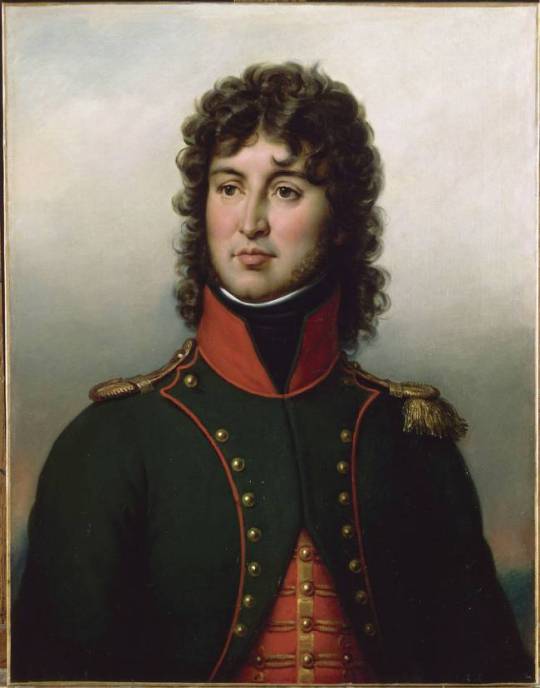
Joachim Murat en uniforme de sous-lieutenant au 12e Régiment de Chasseurs en 1792 (Age 25), by Jean-Baptiste Paulin Guérin, 1835
His name will later be inscribed on the Arc de Triomphe de l'Etoile. On April 5, 1791, three young people from Quercy (Murat, Bessieres and Ambert), appointed by the Lot Directory to be part of the King's constitutional guard, whose creation has just been voted by the Legislative Assembly, take the road to Paris. Coming from a family of small social status, Murat will reach the highest military glory thanks to the Republican wars and the prestigious imperial epic.
He was born on a causse with unexplored abysses
Joachim Murat was born on March 25, 1767, at La Bastide-Fortunière, a village in the Causse de Gramat. This physical environment has a certain connection with the future King of Naples' life and character. “La Bastide, a small village on the high plateau, looks like a fortress commanding the country. This majestic appearance amidst the drought, the almost desolation of the limestone soil which unexplored abysses hollow out in some places is the very image of Murat's life, a life full of contrasts where the good and the worst intertwine, where the peak honors and glory are next to disasters, mentions Marcel Dupont in his work on Murat. The sometimes violent wind is still a striking image of the marshal's mind, always filled with clouds and where hopes, vast projects, fury and annihilation collide day and night. Here is summarized in a few strokes, the prodigious and fatal destiny of this horseman who would have no equal to descend like a windstorm on the enemy troops.
His mother Jeanne's favorite child
Yet he seemed destined for a peaceful existence. Murat comes from a family that has lived in the town for more than three centuries. They are hard-working peasants, exploiting poor soil in harsh winters. How could a king arise from this modest environment more conducive to the development of country virtues than to warlike exploits?
This required the ardor of his youth, which will never leave him, but also the revolutionary upheaval. His father exploited the lands of "a few enlightened minds" in the village. Not being the owner, he is the manager, receiving earnings proportional to the crops. These are certainly satisfactory because the couple have a large house in the center of the town. This is the mother’s domain. The ground floor has been converted into an inn and the floor is divided between the family apartment and a few rooms for passing guests. This energetic woman who runs the inn is a caring mother. The good Jeanne Loubières, whom he will adore all his life, in fact, makes of the youngest of her eleven children, her favorite. By her constant presence, her desire to provide Joachim with an education, that goes beyond that of his environment, she will shape this son to the point that he will never forget his childhood.
With his curly hair and cheerful face, he's a rowdy kid, sometimes a brawler, as it should be to be respected in this country where endurance is proof of character. His time at La Bastide-Fortunière school made a good impression on his teachers: he is an average student but whose qualities of camaraderie and friendliness are recognized. His loving mother, who has deep religious feelings, thinks that the day will come when young Joachim will enter the Orders and may be parish priest of La Bastide.
His great pleasure is to lead alone the horses to the village trough. At the age when a horse seems formidable to a child, Joachim, who has an unusual vigor, already knows how to subdue them.
An amazing ability to lead
These predispositions did not arouse any suspicion among his parents who obtained a scholarship to send him, at 10 years old, to the Saint-Michel college in Cahors. He will stay there for 8 years. It is there that he will have as a comrade Jean Bessières from Prayssac, a future Marshal of the Empire. An unwavering friendship is born between these two men who would become close to the emperor.
Far from La Bastide, the young Murat discovers unknown horizons which open up new appetites for him. His intelligence is real. But as soon as he crosses the threshold of the class, he takes a singular ascendancy on his comrades, even develops an astonishing capacity to lead. How to blame him? If he goes too far for his age, he knows how to repent, implore and become very sweet again.
His whole life, he will use these weapons. Many contemporaries believe that he is completely sincere. Going from anger to tenderness, from elation to dejection, he is already and will remain, impulsive, even excessive in everything. Not without kindness and generosity.
At 20, he joins the cavalry
At the age of eighteen, he joins the Lazarists' seminar in Toulouse. But wearing the cassock does not make the seminarian. And this handsome young man of 1.85 meters, with a pleasant smile, already leads, outside the establishment, a private life the "good fathers" ignore. Here comes an important moment in Murat's life: his military engagement. It is allowed to think, with Jean Tulard, that after a quarrel, our too fiery seminarian was excluded from the University and dreading his father, takes advantage of the passage of the Cavalry of the Ardennes regiment to sign up for, he says "a life that does not displease him". In fact, the new Chasseur is "thrilled". He quickly stood out for his ability to train the most reticent horses and quickly became sergeant*.
For the simple rider, the days are repetitive and gruelling. After an early awakening (at six o'clock), you must groom sick animals, currycomb and brush them before preparing fodder, water and oats. It is only after this daily work, at ten o'clock that a soup is distributed. Then the upkeep chores of the stables. Strict rules still from the Ancien Régime! Because already Parisian ideas are swarming in the garrisons.
Giving free rein to his temperament, his need to be a leader, Murat, who places a lot of hope in the new ideas, takes the lead of the discontented men of the Regiment. This behavior is little appreciated by his leaders: he is put on permanent leave and expelled from the army. Humiliated, he decides to go back to the Lot. We are in 1789.
Delivery Clerk in Saint-Céré
Very badly received by his father who cuts him off, he returns to Saint-Céré where he is hired as a delivery clerk. For a few months, he was enraged, champing at the bit with impatience, convinced that his place is not here. The villages are buzzing. He became aware of the real state of France, of the mounting demands of the campaigns. Murat takes advantage of this return to his native land to attend and participate in public meetings of local clubs.
The past winter has been harsh and long. The harvest was poor. Lack of food and unemployment strike everywhere. Castles see their dovecote burned down. " Here will be hanged the first inhabitant who will pay the rent to the lord," says a poster from a Cahors merchant. It’s the revolt. Louis XVI summons the Etats Généraux on May 1, 1789 in Versailles. In 1790, for the Fête de la Fédération on July 14, each department must appoint two to three delegates. You can imagine that Murat is volunteering! The sympathetic, sweet talking but proud young man speaks. And it is in Lotois dialect that he expresses himself in cafes, wishing to reach the greatest number. The Revolution is born: Joachim Murat, who is part of the Third Estate by his origins, tries to change public opinion according to events. Every Sunday, he goes to Cahors: he listens, he harangues the crowd. He is on the Montfaucon list and is chosen to represent the Lot department.
The republican patriot leaves for Paris
Murat, 23, can go and explore the capital. It’s the consecration.
A new man is born. After a secular mass celebrated by former Bishop Talleyrand, speeches on the Champ de Mars ignite the crowds. One hundred thousand Parisians came to celebrate the first anniversary of the Capture of the Bastille. A year later, returning to the army, he is appointed to the King's Constitutional Guard, to protect but also to monitor Louis XVI. Indignant, the protester manifests a flawless patriotic commitment, calling himself a "pronounced republican", facing "this hideout of royalists who gravitate around the king". But the wind turns, Robespierre falls. His revolutionary passion almost interrupted his meteoric career. Bitter and worried, he is put on leave and returns for some time to Quercy, "wanting to become a simple plowman again".
Aide de camp
Skeptical about his future, then dejected, Murat quickly reacts, helped by the deputy for Gourdon, Jean-Baptiste Cavaignac, who encourages him to return to Paris. It is on the night of 12 to 13 Vendémiaire (October 5, 1795) that Murat is put in contact with the First Consul who needs him. He orders him to save the Convention threatened by the royalist riot. Forty cannons are placed by Squadron Leader Murat around the Tuileries Castle. Three hundred royalists will be killed. The government of the Republic is saved again. As Tulard points out: "From now on the star of Murat will merge with that of Bonaparte". No more depression, finally power and glory.
Promoted Bonaparte's aide-de-camp, he leaves for the Italian Campaign, direction Marengo. There, "his clothes will be riddled with bullets", but they will know victory.
He becomes Napoleon I's brother-in-law
In 1800, he marries Caroline, the First Consul's youngest sister, becoming the brother-in-law of the future Napoleon I. This marriage will give Murat an outstanding position among the marshals of the Empire. Quickly, he is invited to move to the Château des Tuileries and becomes part of the close entourage of the new master of France.
The rouser of men from the imperial epic will remain kind to his family at La Bastide. Coming from a small inn in Quercy to fly with his squadrons across Europe and into Egypt, Murat seems like a legendary character. Chateaubriand will devote long passages to him in the "Mémoires d'Outre Tombe". He will be admired by Stendhal, Dumas and Balzac. Three words characterize the King of Naples: ardor, ambition and panache. If he remains the most magnificent rouser of men the imperial epic will produce, he will invest much into the Lot whose deputy he will become in 1803.
And he will show kindness for his whole family. Especially for his mother, for whom he will show a deep attachment: he sends her rosaries blessed by the Pope.
The portrait he has done of Jeanne in 1792 will never leave him. It will be with him, in his homes, in his tent during his campaigns and in Naples, in his palace. He will build a castle for his "La Bastide family" in his native village, modeled on the Palais de l'Elysée, where he had resided as governor of Paris.
The King of Naples dies executed on October 13, 1815.
By André Décup
[Translation is mine.
Note: I translated by ‘sergeant’ the grade of Maréchal des Logis, which is its equivalent in the cavalry (and nowadays in the Gendarmerie).
There is no right translation for “entraîneur d’hommes”, I hope “rouser” doesn’t seem too weird in English.]
34 notes
·
View notes
Photo

Though he runs his country's largest library, Alberto Manguel is not a huge fan of borrowing books.
"I love libraries. I love the building, I love the feel, I love the rows of books," the director of the National Library of Argentina says.
"But if I ask for a book and I like it, I want to take it away and I want to write in the book, which of course is not allowed.
"It's too tempting. I want the books that I read to be mine, and to take them to bed. You can't do that with books from a public library."
It's this attitude that helped him develop a collecting habit bordering on the pathological — and a library that's very hard to say goodbye to.
Grieving the death of a collection
When Manguel, also a noted writer and critic, recently moved from his large country home to a small city apartment, it meant dismantling his collection of 35,000 books and packing them away.
He likens the process to a burial.
"You put things away in boxes. Sometimes at night they come back to you, but for the most part it is forgetting," he says.
"It's not an exercise that I enjoy."
The sense of grief he describes at losing his collection is palpable.
"But then bureaucracy intervened and all these other nasty things, and we sold the house and packed the books and left.
"You think that you are in paradise and you forget that paradise is the place you are condemned to lose."
He wrote about dismantling his collection, organised variously by language or subject, in his book Packing My Library: An Elegy and Ten Digressions.
How to grow an obsessively large library
If you aspire to a collection like Manguel's, and have the shelf real estate, here are some tips to kick you off.
Step one? Don't lend books.
"I never lend a book. To lend a book is to tempt the reader with theft. Books are seldom returned," Manguel says.
"If I want somebody to read a book I would buy the book for that person and give it to that person.
"I believe in Polonius's advice to his son — I've got [Shakespeare's Hamlet] in my library: 'Neither borrower nor lender be'.
Step two: follow your nose.
Manguel says his collection reflects his "cornucopia of interests".
He has thousands of detective novels, but very few spy stories, more Plato than Aristotle, the complete works of Zola, hardly any Maupassant, all of John Hawkes and Cynthia Ozick, but few authors on the New York Times bestseller list.
"I don't feel forced to own any book. I don't feel forced to read something because I'm told it's a classic or because I hear that it's on the bestseller list," he says.
And he rubbishes the notion that you shouldn't judge a book on its cover.
"I let myself be guided by my taste. I'm interested in the title or the cover of a book, or something I've heard about the author," he says.
"I bought a book that I loved that has this irresistible title: Dostoevsky Reads Hegel in Siberia and Bursts into Tears.
"How can you not read a book with that title?"
'Nothing wrong' with obsessions
Manguel is happy to admit his book collecting is obsessional.
"But there's nothing wrong with an obsession as long as it doesn't push you to commit a crime," he says.
That his habit has no kill switch has been the source of some tension in his household.
"My partner once complained that we had two volumes of an economic history of Nigeria; why would we want this?" he says.
But he does draw a line in the book-collecting sand.
"I'm glad to say that I have no John Grisham in the library," he says.
"Mark Twain said that a good way of starting a library is leaving out the works of Jane Austen. I would say the same with John Grisham."
Books offer 'safe' places
While Manguel is a collector, and not a borrower, libraries will always be his safe place.
He contrasts the order of a library with the disorder of the world.
"The most obvious thing we know about the world is that it is chaotic, that is has no meaning, that there is no rhyme or reason to everything that surrounds us," he says.
"There are natural laws of course, but the story in which we are inserted has no sense.
"Yet, what we take we take from the world, our experience of the world, and that experience written out in books, constitute a kind of order."
This order, he says, helps to make sense of, and find peace within, a chaotic world.
"I feel very much when I'm in the library that I'm in an ordered place, and even if the order is arbitrary — whether it is numerical or alphabetical or even through subject — there is some feeling that I'm in a place that is coherent and safe."
Daily inspiration. Discover more photos at http://justforbooks.tumblr.com
26 notes
·
View notes
Text
Burst Quiz Commercial Real Estate Investing

I read once that in case you took all the real estate lawyers in Illinois and additionally laid them end to end along the equator - it will be a good idea to leave them there. That's what I learn. What do you suppose that means? I have written before around the need to exercise due diligence when purchasing commercial real estate. The requirement to investigate, before Closing, every significant aspect of the property you happen to be acquiring. The importance of evaluating each commercial real estate contract with a mindset that once the Closing occurs, there is no coming back again. The Seller has your money and is gone. If post-Closing challenges arise, Seller's contract representations and warranties will, within best, mean expensive litigation. CAVEAT EMPTOR! "Let the individual beware! " Paying extra attention at the beginning of a advertisement real estate transaction to "get it right" can conserve tens of thousands of dollars when the deal goes bad. It's for instance the old Fram® oil filter slogan during the 1970's: "You can pay me now - or pay me later". In commercial real estate, however , "later" may be too latter. Buying commercial real estate is NOT like buying a home. It is far from. It is not. It is NOT. In Illinois, and many other states, just about any residential real estate closing requires a lawyer for the buyer along with a lawyer for the seller. This is probably smart. It is decent consumer protection. The "problem" this causes, however , is without a doubt that every lawyer handling residential real estate transactions considers by his own or herself a "real estate lawyer", capable of handling any specific real estate transaction that may arise. We learned in legal requirement school that there are only two kinds of property: real estate in addition to personal property. Therefore - we intuit - should we are competent to handle a residential real estate closing, we've got to be competent to handle a commercial real estate closing. There're each "real estate", right? ANSWER: Yes, they are each one real estate. No, they are not the same. The legal issues and negative aspects in a commercial real estate transaction are remarkably different from a legal issues and risks in a residential real estate transaction. Nearly every one is not even remotely similar. Attorneys concentrating their practice managing residential real estate closings do not face the same issues because attorneys concentrating their practice in commercial real estate. This can be a matter of experience. You either know the issues along with risks inherent in commercial real estate transactions - and even know how to deal with them - or you don't. A key point to reconsider is that the myriad consumer protection laws that take care of residential home buyers have no application to - and offer no protection for - buyers of commercial properties. Competent commercial real estate practice requires focused and centered investigation of all issues material to the transaction by a professional who knows what they are looking for. In short, it requires all the exercise of "due diligence". I admit - the actual exercise of due diligence is not cheap, but the failure for you to exercise due diligence can create a financial disaster for the professional real estate investor. Don't be "penny wise and pound foolish". If you are buying a home, hire an attorney who regularly presents home buyers. If you are buying commercial real estate, hire your lawyer who regularly represents commercial real estate buyers. Years ago When i stopped handling residential real estate transactions. As an active business oriented real estate attorney, even I hire residential real estate endorse for my own home purchases. I do that because readily available real estate practice is fundamentally different from commercial real estate. Could be I do "harp" on the need for competent counsel experienced on commercial real estate transactions. I genuinely believe it. I feel it is essential. I believe if you are going to invest in commercial real estate, you ought to apply your critical thinking skills and be smart. BURST QUIZ: Here's is a simple test of YOUR critical believing skills: Please read the following Scenarios and answer any questions TRUE or FALSE: Scenario No . 1: It will be Valentine's Day. You are in hot pursuit of the love you will ever have. A few weeks ago, she confided in you that all the woman ever dreamed of for Valentine's Day was that her mate would show up at her door, dressed in a bright white tuxedo with tails and a top hat, and gift her with a beautiful bouquet of flowers. You've hired the tuxedo, but now you are concerned about how much money you may be spending. TRUE OR FALSE: Since flowers are largely all the same, it is OK for you to skip the roses not to mention show up with a bouquet of fresh yellow dandelions. Problem No . 2: For several years you eyesight deteriorated to the point to barely see your alarm clock. You are now considering corrective eye surgery so you won't need glasses. Your sister-in-law had corrective eye surgery and has had spectacular outcome. She recommends her eye surgeon, but mentions the retail price is about $5, 700 for both eyes and that the particular surgery is not covered by insurance. A few years ago, you had surgical procedure to correct your hemorrhoids and it cost you only eight hundred dollars. TRUE OR FALSE: Since surgeons all went to health related school and are all medical doctors, you are being frugal and also wise by asking the surgeon who performed the hemorrhoid surgery to perform your corrective eye surgery. Dilemma No . 3: Several years ago, when you first got married, you quizzed a former classmate who is a lawyer to represent a person in the purchase of your townhome. The cost was only $375. A year later, you started a family and decided you will needed a Will. The same attorney prepared Wills available for you and your wife for a total cost of $700. You will started your own business and your attorney friend formed the corporation for you and charged you only $600 plus the price tag of the corporate minute book. Years later, when your child was arrested for misdemeanor reckless driving, your solicitor friend handled the criminal case and got your own son off with supervision for only $1, 500. Your business has been successful and you have built a pretty substantial nest egg, but you are tired of working for every nickel and want to try investing in real estate. You have your vision on a strip shopping center. It includes a grocery store, bank, equipment store, dry cleaners (on a month to month tenancy), a couple of fast food restaurants, a gift shop, dental office, bowling alley (with a lease about to expire), and wraps lurking behind a gas station/mini-mart on the corner. The purchase price will be $8, 000, 000, but the net operating income appears to be like pretty good. You figure if you turn the bowling street into a full service restaurant/banquet facility, and convert typically the dry cleaners into a 24-hour coin laundry, the net managing income will increase and the shopping center will turn into a spectacular investment decision. You plan to pull together much of your life savings plus put down $2, 000, 000 to buy this strip shopping center, borrowing the balance of $6, 000, 000. You bear in mind that your lawyer friend handled the purchase of your home several years ago, so you know he handles real estate. TRUE OR UNREALISTIC: Commercial real estate is the same as residential real estate [Hey, the all dirt, isn't it (? )], so you are now being a shrewd businessman by hiring your lawyer pal who will charge much less than a lawyer who handles shopping mall purchases several time a year. [What is the "due diligence" stuff anyway? ] ANSWERS: If you clarified "TRUE" for any of the foregoing Scenarios STOP! The Questions is over. Please find a quite place to reflect upon your wellbeing and consider whether the decisions you make consistently provide you with the results you desire. If, on the other hand, you understand that the answer to every single foregoing questions is FALSE, I am available to help you in Predicament No . 3. For Scenario No . 2, you should go along with your sister-in-law's suggestion and contact her eye operating specialist, or some other eye surgeon with equal skill. Just for Scenario No . 1, you are on your own. [But, any time you answered TRUE for Scenario No . 1, you may be ALWAYS AND FOREVER on you own. ] Investing in commercial real estate can be worthwhile and rewarding - but it requires good critical thinking about skills and competent counsel. You have a have a brain. It will be strongly recommended that you use it. R. Kymn Harp is actually a seasoned attorney based in Chicago, Illinois with 30 numerous years experience representing commercial real estate investors, lenders and administrators. He is a frequent speaker at continuing education tutorials, and is a widely published author on commercial as well as industrial real estate topics including due diligence, entitlements, commercial realty financing, and Brownfield development and financing.
1 note
·
View note
Text
Favorite Son
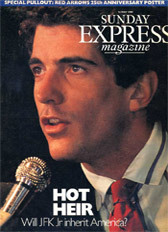
It was madness, even by Bloomingdale’s standards. The customers that late-November lunchtime were possessed by an urgency that transcended mere pre-Christmas shopping lust. Suddenly, TV lights came on and cameras started snapping like piranhas as the day’s hottest item, John Fitzgerald Kennedy Jr., the son of America’s thirty-fifth president, stepped onto a platform. Women screamed.
“It was mass hysteria,” one store worker says. “Poor man. I don’t think he had any idea.” Kennedy looked amazed and none too happy. “Oh, dear,” he said as he joined cousins Ted Kennedy Jr. and Willie Smith, Willie’s mother, Jean Kennedy Smith, and Lauren Bacall on the store’s loge level.
Very Special Arts, a Kennedy charity, was behind this sale of boxed Christmas ornaments produced by the retarded in Third World countries. But the TV crews and the screaming women and the pushing paparazzi didn’t care about that. They didn’t care about Betty Bacall, either, or the other Kennedy cousins — all associate trustees of the Joseph P. Kennedy Foundation who had funded the program. Says the Bloomingdale’s employee, “They wanted John.”
Kennedy took the microphone. “I hope you’ll all buy a few boxes,” he said. “I’m here to sell boxes, and that’s what I want to get to do.” Of course, by doing that-or, more precisely, by autographing boxes for a few minutes-he got the ornaments mentioned on seven local news shows and Entertainment Tonight. Jill Rapaport, a perky Channel 2 News reporter, even got a brief interview. “It’s really the boxes they should be coming for, not us,” Kennedy told her. Then he got boxed in himself as Rapaport asked how it felt to be one of the world’s most eligible bachelors. “C’mon,” Kennedy pleaded, eyes and hands turning upward. “1 dunno.” He glanced away from the microphone hopelessly. Finally, visibly embarrassed, he said, “It feels okay.” Cut to Rapaport happy-talking in the studio later. “Kinda cute, huh?” she said to the camera.
Although Bloomingdale’s sold almost $50,000 worth of ornaments that day, John Kennedy, 28, considered the appearance disappointing. “We didn’t want it to turn out the way it did,” says Kathy Walther, a Very Special Arts executive. “It was very obnoxious from the second he walked in. John hoped it would be more substantive.”
Unfortunately, substance isn’t ‘the first thing that comes to mind when most people think about John F. Kennedy Jr. First, of course, comes the awful, indelible memory of the little boy in a blue coat and short pants, saluting his father’s bronze coffin.
That image alternates with others not so sober: Kennedy pumped-up and shirtless as People magazine’s “Sexiest Man Alive.” Kennedy linked in the columns with an enviable parade-Brooke Shields, Madonna, Daryl Hannah, Molly Ringwald, Princess Stephanie of Monaco.
Those images melded at his political coming-out party, last summer’s Democratic Convention-where John F. Kennedy Jr., tabloid celebrity, was transformed into the living embodiment of a nation’s not-quite-impossible dream: that it will wake up one morning with another JFK in the White House. Uncle Ted Kennedy passed the torch himself when he had John introduce him to the delegates, and though the nephew’s speech didn’t rattle the rafters, there was a surge of emotion in the hall. This was the first time John had ever acted the part of “a Kennedy” on a national stage. And the moment suggested that he could become the ultimate postmodern politician-a blank canvas for fantasies of national destiny.
* * *
The boy in the blue coat is grown up now, and, whether he likes it or not, people still have their eyes on him. He doesn’t like it at all, and friends insist that his life is a quest for anonymity and normality. He may never find privacy (“He’s never known life any different,” says a friend), but he’s won the battle to be normal. Aggressively normal. “Disgustingly normal,” says a friend.
He is also understandably reluctant to give anything away, having already given so much. Kennedy “is trying to have an open life,” says Faith Stevelman, who met him on their second day of law school, in 1986. “He sure turned out to be completely different than I expected. The press makes him out to be a narcissistic celebrity brat, but he’s not. People want to see him that way, because of his father, because of his name, because he’s handsome, but-praise to him-he has a life that’s much more real than that. He likes being in the world.”
He doesn’t like publicity, though. “It curtails his freedom,” Stevelman says.
So, aside from lending his name to good causes, he’s done nothing to attract attention to himself. He’s given only one print interview in his life, to the New York Times, and it wasn’t particularly revealing. Not speaking to reporters “has always been a habit,” says his aunt Lee Radziwill. “We’re not going to start now.”
One former family intimate describes the Kennedy attitude as “a conspiracy of silence, mandated from above. But when they want to get the message out, they do.” John Kennedy declined to be interviewed for this story. But there’s a message his friends want to get out, so many of them cooperated, as did former coworkers and bosses and a few Kennedy-family members.
They are setting the stage for what a Kennedy Foundation executive describes as “John emerging into the public sphere.” After having worked for New York City, a nonprofit developer, the Reagan Justice Department, and apolitically connected Los Angeles law firm, the man who is perhaps the most famous presidential child of the century is about to become one of about 400 assistant district attorneys in the office of Manhattan prosecutor Robert Morgenthau.
Like a favored candidate’s spin doctors before a big debate, Kennedy’s friends are trying to lower expectations. “The most extraordinary thing about him is that he’s extraordinarily ordinary,” says one.
Public appearances to the contrary, friends seem convinced, and want to convince others, that John Fitzgerald Kennedy Jr. — JFK II — doesn’t really exist. “He wants to be perceived as his own man,” says Peter Allen, a friend since grade school. Says Stevelman heatedly, “He’s not John F. Kennedy Jr. He is himself. It’s `Hi, I’m John.’ ” Just John.
John doesn’t share the problems of some of the other Kennedy cousins of his generation. “Monsters,” the former family friend calls them. A friend of John’s agrees: “They might as well have the name emblazoned on their sleeves.” John does share many traits with his father, though-and people want to believe he shares even more. Just like his father, he is bound up with his immediate family. “All of our lives, there’s just been the three of us — Mommy, Caroline, and I,” John said at his sister’s wedding. Besides them, he’s got a coterie of intensely loyal friends-some of whom go back through prep school just like his father’s. At Brown University, where John earned a bachelor’s degree in history in 1983, his friends literally surrounded him, shielding him from the 14,500 spectators during their mile-long graduation processional. John’s also got his father’s charisma. “Even if he wasn’t John Kennedy,” says his cousin Cecil Auchincloss, “people would notice him at a party. Even as a kid.” Though he seems to disdain Kennedy competitiveness (when he was a child, the cousins called him “Mama’s Boy”), John shares his father’s love of athletics. An active outdoorsman, he skis; rafts, snorkels, hikes, and goes camping. “He’s an overenergetic, can’t-sit-still type,” a friend reports.
Also like his father (and like his mother’s father, Black Jack Bouvier, who had an affair on his honeymoon), John’s got serious sex appeal. “The apple doesn’t fall far from the tree,” says a young woman who knows him. “Girls come and go.”
In fact, only with women does John act as if he wanted to be noticed. “It’s no wonder rumors start,” says one woman he’s flirted with. Adds another who encountered him on the street, “He was begging for attention.”
He doesn’t always have to beg. Madonna, this generation’s self-styled Marilyn Monroe, set her cap for John. “He and Madonna were good friends,” says a fast-crowd friend of the Kennedy cousins. “She was obviously the aggressor.”
Friends of John’s also believe that their contacts were all initiated by Madonna. “I think they met when [John's cousin] Bobby Shriver made his Special Olympics album,” says one pal. “Then Madonna invited John to her concert at Madison Square Garden. She also works out with the same trainer. I don’t think that’s chance.” Though some insist that John has had “dates” with Madonna between rounds in her marital bout with Sean Penn, a close friend of the singer’s sighed when I asked her if the duo’s rumored relationship was real. “If only,” she said.
Many of John’s supposed assignations turn out to be fictions. Another Kennedy “date,” identified in some papers as Molly Ringwald, was actually John’s steady girlfriend of four years, actress Christina Haag. “A good thing,” a friend jokes. “Christina would have believed it.”
Haag, the daughter of a retired businessman, grew up in Manhattan. She is not the blue blood she’s sometimes made out to be; she’s an actress struggling to make ends meet. A graduate of Juilliard, she has played Ophelia at Center Stage in Baltimore, acted in A Matter of Degrees, an independent film about college students, and played the public-relations woman for a hospital in The Littlest Victim, an upcoming TV movie about a doctor who treats children with AIDS. Between jobs, she has checked coats at Elio’s and worked as an assistant to Seventh Avenue designer Christine Thomson.
Luckily, both John and Christina know Daryl Hannah and knew it wasn’t true when, late last year, Suzy said he’d proposed to the star. Says a Kennedy friend, “They’ve all known each other for years.” A gossip item once appeared saying that Hannah, the daughter of a Chicago real-estate magnate, had followed college-age John down a beach on St. Martin. “They were twelve at the time,” says the friend, “and I bet he followed her. If she’d been following him, he would have stopped.”
Then there are the models. Kennedy has met some through Richard Wiese, a Phi Psi fraternity brother at Brown who is now a Ford model. Audra Avizienis, a Click face, told People she had dated John. Now she claims the magazine misquoted her. People’s reporter denies it. So has she gone out with him? “That’s beside the point,” Avizienis snaps.
An older friend of the family considers this all par for the course. “Kennedys love beautiful people, winners,” she says. “They like movie stars, like everyone else. But everybody else isn’t moving in those circles all the time. Kennedy men are intensely, highly sexed. There’s a lot of activity. But the women they marry are solid gold. They need both and they get it. Why not have the cream of the crop?”
There are two other traits Kennedy shares with his father: wit and a penchant for pranks. While working for the city after he graduated from Brown, he kidnapped a secretary’s beloved teddy bears, sent her a ransom note (“We have the bears”), and then executed them in a mock mass hanging. He also sent a stripper to meet with a co-worker who was interviewing prospective secretaries. “I thought she was a good candidate,” the co-worker says. “More articulate than most.”
* * *
Carried to extremes, pranks can reflect an underlying carelessness. But “there’s an incredible amount expected of John,” a friend points out. “He has to sacrifice what a lot of us would consider routine.”
John has had several minor run-ins with the law. Last year, he paid $2,300 in parking tickets. “I later learned the reason [he paid them],” says J. Bertram Shair, the administrative judge who heard Kennedy’s case. “He has to clear himself of all judgments in order to qualify for the D.A.’s office. I don’t think he enjoyed writing the check. He said in view of all the tickets, perhaps he ought to get free parking in the future.” Shair gave him “a gratuitous little lecture. I told him he’s going places. He should take care how he’s perceived.”
The blackest mark on Kennedy’s record is one that will be understood by anyone with a passing knowledge of the habits of 24-year-old men. Between 1984 and 1986, he and a friend sublet a co-op apartment on West 86th Street. According to someone close to the deal, Kennedy was often late with his rent checks and could never remember his keys. “He rang everyone’s buzzer,” the source says. “He drove the super crazy. He had a water bed, which was against the rules. The board was within inches of evicting them.”
Finally, their sublease ran out and the owner returned. “It looked like a herd of yaks had lived there,” the source says. “Somebody had clearly put their fist through the wall. The carpet looked like they’d had cookouts on it. Every surface had to be sanded, spackled, and patched.”
The current president of the building’s co-op board is forgiving, though. “People tend to be tougher on personalities than on the rest of us,” he says.
An older and presumably wiser Kennedy now lives alone in a two-bedroom apartment in the West Nineties. He keeps his keys tied to his belt. Though his new apartment has been “nicely done” with his mother’s decorating help, a friend says it is often “kind of messy.” Christina Haag lives nearby. Kennedy often has breakfast at a health-food restaurant on Columbus Avenue. Then he bicycles 90 or so blocks south to the Village, where he spends his days completing his third and final year at the New York University School of Law. He also works in Brooklyn Family Court, where, as a member of NYU’s Juvenile Rights Clinic, he defends minors accused of felonies.
Late last year, after a series of interviews, he got the $29,000-a-year A.D.A. job, which friends say he coveted. Morgenthau’s office will not confirm Kennedy’s appointment, but friends say he will start work in August.
John and his sister seem to be remarkably solid young people, given the circumstances of their lives, and everyone directs the credit to their mother, Jacqueline Onassis. Under unbearable scrutiny, she raised them amazingly well.
John was known at the three private schools he attended as bright but more rebellious and troubled than Caroline. His most embarrassing teenage moment involved drinking. He and Caroline celebrated their birthdays (his eighteenth, her twenty-first) with a bash at Le Club, arranged by their mother. At five in the morning, as the party broke up, Kennedy and his school friends fought with a National Enquirer photographer. “I opened the door and John was lying in the gutter,” says Patrick Shields, the club’s director, who dusted Kennedy off and deposited him in a taxi. “Jackie’s comment to me the next morning was `I’m walking on a cloud.’ ” Adds Shields, “I don’t think she’d seen the paper yet.”
* * *
John Kennedy has been a public curiosity since he was conceived. He gave out a “lusty cry” at birth, according to the obstetrician who delivered him by cesarean section on November 25, 1960. Seventeen days before, his father had been elected president. As the first White House baby since 1893, John Jr. made front pages around the world. After his christening, his 31-year-old mother imposed a press blackout. The publicity-conscious president fought it with mixed success by sneaking photographers and the kids into the Oval Office when Jackie was out of town, but still, no photos of John were released for a year.
Tidbits about him did leak out, though. In May 1963, he sucked his thumb while meeting astronaut Gordon Cooper but took it out long enough to say “Cooper, Cooper.” And in November 1963, at a Veterans Day program at Arlington National Cemetery, John-John, as he was called, upstaged the troops by performing acrobatics while dangling from the hands of his father and an aide. A few weeks later, the president boarded a helicopter at the White House for a flight to Andrews Air Force Base and then to Dallas. It was the last time he saw the young son Jackie said was “his real kin spirit.”
As a child, John would talk about his father proudly. “He was fascinated,” says a family friend, “and he enjoyed hearing how people responded to that little boy.”
Friends say that now, though John rarely brings up his father, he is gracious when others do. Nevertheless, awkward moments do occur. “One time he was hanging out in somebody’s room,” recalls a fraternity brother, “and they were playing the Stones’ `Sympathy for the Devil’ ” (which contains the lyric “I shouted out, `Who killed the Kennedys?’ / When after all / it was you and me”). “Everyone realized, `Uh-oh.’ But at some point, he’d just walked out and then he walked back in again. He just avoided the situation.”
Friends are careful with him. “It’s never come up and I wouldn’t bring it up,” says Stevelman. “It can’t be an easy thing. During the week of the [twenty-fifth] anniversary [of JFK's assassination], I was worried for him. Who wants to be exposed to that? But he’s incredibly together about it. I’m sure it moves him. How could it not? But he’s integrating it into a sane life.”
“I think he’s very proud of what his father did,” adds another,
Aristotle Onassis died in Paris on March 15, 1975. Jackie’s $26-million settlement with his estate, negotiated with Christina Onassis, added to established Kennedy trust funds and left the children without financial worries.
During the mid-seventies, John was listed in the Social Register, regularly saw a psychiatrist, and changed schools again, transferring to Phillips Academy in Andover, Massachusetts. After being held back a year, he finally graduated in 1979. “He certainly wasn’t at the top of his class,” says a longtime friend.
John also. spent some time at Xenon, the club owned by Howard Stein, who calls himself a “disco uncle” to the Kennedy cousins. They were treated like kings by Stein’s partner, Peppo Vanini, who considered them “the closest thing to royals in America,” Stein says, “and made overtures to induce them into our world.”
Robert Kennedy’s children became Xenon regulars, but “John-John was special,” Stein says. “He was less a disco baby. He was shier, ingenuous. He didn’t leverage his name off the way kids of the famous do in my world. He had star quality. So every time he was there, he got his picture in the papers. It took a scandal for the other Kennedy kids to be photographed.”
* * *
In the next half-dozen years, John would be photographed often in discos with a steady girlfriend, Sally Munro, who was in the class ahead of his at Brown. Kennedy, ever the prankster, identified her to photographers as “Lisa, my fiance.”
Nightlife wasn’t the only temptation. Girls slept outside the door of his dorm room when he was a freshman. He later moved into the Phi Psi house and then into a house off campus that he shared with several students, including Christina Haag. Kennedy was also attracted to the stage, appearing in campus productions of Volpone, Short Eyes, and In the Boom Boom Room. Producer Robert Stigwood even offered John a part in a film, as his father. He was interested. His mother, reportedly, was upset.
The professional offers kept coming after he left Brown “bad things, because of who he was,” says Peter Allen. “He thought it would be fun, but he didn’t want to trade on his name.”
Show business remained alluring, though, and in the summer of 1985, Kennedy finally appeared on a Manhattan stage, starring in six invitation-only performances of Winners at the 75seat Irish Arts Center. The show was a workshop mounted by friends from the drama set at Brown. Christina Haag was a costar.
Kennedy and Haag played star-crossed lovers in Northern Ireland. Leaving the theater one night, John told a reporter, “This is not a professional acting debut. It’s just a hobby.” And reports vary on his talent. A Brown critic once took exception to his “prep-school voice.”
Sometime after the short run of Winners, John’s relationship with Sally Munro ended amicably and Christina Haag stepped into the role of girlfriend. “John had had a secret crush on her since he was five,” says a friend. “Actually, I don’t think it was secret. He asked her out every week and she said no every time.”
Friends say Haag is whimsical, stylish, and quite serious about her career-and that her relationship with John has not always helped it. She never trades on him, they say. Indeed, she avoids publicity that might help her. “They make her sound like a hanger-on,” a friend says. “The fact is, her boyfriend takes away from her craft.”
Friends admit that John and Christina have had some rough sledding. For a while after college, John “was playing around a lot,” says a former co-worker. “He got along well with girls. He enjoyed it, like anyone would.” But now, according to friends of Christina’s, the relationship is strong. Haag even refers to herself as his “law widow.”
* * *
Until now, no one has asked much of John Kennedy. But quietly, off the gossip pages, he has built an impressive resume for a young man just starting his career. The summer before he went off to college, he attended National Outdoor Leadership School with students from the United States and Africa, studying mountaineering and environmental issues at 17,000 feet on Mount Kenya. The next summer, he met government and student leaders in Zimbabwe, and worked briefly for a mining company in Johannesburg. Maurice Tempelsman — Jackie’s diamond merchant companion-probably had a hand in planning the trip.
After his sophomore year, he worked for Ted Van Dyk at the Center for Democratic Policy, a Washington-based liberal think tank. Again, Tempelsman suggested that John apply for the student internship. Living with the Shrivers, Kennedy immersed himself in political organizing, advance work, research, and working the room on a fund-raising trip to Hollywood. That summer, he saw for the first time the power he had. “He began to realize he was a celebrity,” says Van Dyk. “He had his first contact with clutchers and grabbers. He handled it.” John even talked back to Norman Lear, who, says Van Dyk, “went on about what close friends he was with the president,” then said he was saving his money for his own lobbying group, People for the American Way. “You’d be better served giving the money to us,” Kennedy said.
John was “genuinely undecided” about his future, and Van Dyk was sympathetic. “You get a churning stomach thinking about all those Kennedy kids in politics,” he says. “You’re pleased to see them respond as several have, yet relieved when any of them decides to do something else. An expectation hangs over them. I don’t think John feels compelled.” Still, back at Brown, John worked for the University Conference for Democratic Policy, which sponsored disarmament forums on northeastern college campuses.
The summer after his junior year, Kennedy and his cousin Tim Shriver tutored underprivileged children in English as part of a University of Connecticut program. Finally, after he graduated, he stopped for some fun, signing on as first mate on the Vast Explorer, searching for the pirate treasure ship Whidah in the waters off Cape Cod.
Following the 1984 Democratic Convention in San Francisco, where he helped Van Dyk raise more money, Kennedy came home and took a job with the city. In his $20,000-a-year position in the Office of Business Development, he worked to attract and keep business in New York. “His references were extraordinary,” says his boss, Larry Kieves. “He worked in the same crummy cubbyhole as everybody else. I heaped on the work and was always pleased.”
John “wasn’t overly sophisticated,” a co-worker adds. “He was one of the few young people there who acted his age.” She fondly recalls how he would change from his bicycle clothes into a suit in the office, but often leave his shirttails hanging out. (Though he still sometimes dresses that way, he was named to the International Best Dressed List this year.)
In 1986, Kennedy switched jobs, moving to the 42nd Street Development Corporation as acting deputy executive director, conducting negotiations with developers and city agencies. Jackie was on the nonprofit company’s board. “John was an intelligent bargain,” says Fred Papert, the corporation’s president. “Salary was not of grave concern to him. He knew his way around the city. He’s unpredictable in a good way. He was both orderly and passionate-a rare combination.”
Kennedy entered law school that fall. The following summer, he worked for William Bradford Reynolds, the Reagan Justice Department’s civil-rights chief, making $358 a week as one of seven interns. Last summer, his salary improved when he became a $1,100-a-week summer associate at Manatt, Phelps, Rothenberg & Phillips, a Los Angeles law firm with strong connections to the Democrats, and worked for his uncle Ted’s lawschool roommate, Charlie Manatt.
* * *
At last summer’s Democratic Convention, major speakers chose the people who would introduce them. Ted Kennedy asked, and John was delighted. So was a party that was “trying to reach out to the younger boomer crowd,” according to a Democratic National Committee official. Backstage, John “was nervous as hell,” reports an observer. He needn’t have worried. “Stars are born at conventions,” the official says. “He certainly came out as a Democrat everyone will be watching for a long time.”
Does John want that? Friends and former employers say that he seems committed to some kind of public service. “He has a great way with people,” says Andrew Cuomo. “He’s as comfortable with homeless kids in a playground as he is at the Democratic Convention, and that’s truly a gift.” In between law classes, he works with Cuomo’s HELP program, the Fresh Air Fund, the Kennedy Library, and the Kennedy Foundation’s associate trustees. The foundation is behind his latest project: working with the City University of New York on a plan to assist the mentally handicapped. “He’s not doing it to get recognition,” says Dr. Jeffrey Sachs, who is working with John. “He’s a real mensch.”
His enthusiasm falters, it seems, only in academia. One of his NYU professors judged him “unremarkable. Given the opportunities offered someone so blessed, one would have wanted him to give more evidence of ambition, drive, and vision. But maybe my course didn’t inspire him.”
Kennedy has apparently found something to inspire him in criminal law. And it isn’t really surprising that a man whose father and uncle were both murdered should choose to become a prosecutor. The A.D.A.’s job is “tough work,” says his law school friend Stevelman. “It takes someone who really wants to get down and deal with real people’s needs. I don’t think John likes things easy or false.”
“His interest in criminal law is marketable and useful,” adds a fellow law student. “He’s not doing it for money reasons. He’s very curious. He’s interested and open. He’s much more comfortable with black people, for instance, than your average kid of his world.”
Before John ever appeared at the Brooklyn Family Court as a student lawyer, Joseph A. Esquirol Jr., the supervising judge, worried that the court would come to a stop. He recalls thinking that “every woman will leave her desk to come see him. “I couldn’t have that,” Esquirol says, so he called his court staff together. “Don’t make it any worse for him,” he told them. “Try not to drool till he’s gone. I want to give the young man a chance to grow in his profession. He has a right to that.”
* * *
Drooling stenographers aren’t the only obstacle Kennedy faces. “How would you feel, if you were a thirteen-year-old arrested for a chain-snatch, if the son of a president was your lawyer?” asks Esquirol, who has presided over three designated-felony cases in which Kennedy appeared. Says a fellow law student, “[Who he is] comes up all the time. John presses it away and goes on.”
NYU officials and teachers will not discuss Kennedy’s grades, but Esquirol gives him high marks. “I don’t know that he’s the best or the worst,” the judge says. “I don’t envy him one minute. I think he can cut it if he’s allowed to practice without pressure. He’s got the innate common sense, ability, anti presence. He knew what he was doing and why he was doing it.” Esquirol pauses. “If I was a father, I wouldn’t be disappointed to have him as a son.”
John’s work with the underprivileged and disabled, his experience bridging the public and private sectors, his inquisitive mind, sense of obligation, and determination to avoid the obvious, a quick run for elective office, reveal a commendable sense of purpose. “He makes good decisions, not facile ones,” says Stevelman. “He makes a point not to make broad decisions about life.” It’s not that he won’t want our votes eventually. He just doesn’t want them now, when all he would be is JFK II. But John F. Kennedy Jr. will always be America’s son, and that’s a hurdle he’ll face for the rest of his life. “I honestly think,” says one friend, “in 100 years, they’ll say that whatever he did, he succeeded not because he was John F. Kennedy Jr. but in spite of it.”.
By Michael Gross Originally published in the March 20, 1989 issue of New York Magazine
11 notes
·
View notes
Text
A Cincinnati Waiter Dreamt Of An Empire In Oklahoma
Roy Van Tress rose quickly from rags to riches. It is too bad that his rise was a fabric of scam and sham, lies and outright larceny. He wanted to build an empire out west, centered on a city named for himself. It was not to be.
Van Tress was a country boy. He was born in 1874 near Waynesville, Ohio, and itched to get out of town as soon as he could manage. He wasn’t yet 20 when he met and married a young lady from Louisville named Sallie Goldberg, with whom he had a son and a daughter.
Roy found work in a Cincinnati hotel but moonlighted as a bicycle thief. He was arrested, escaped from a transport train, hauled back in, only to escape from the Ohio Penitentiary. In January 1899, he was on the lam, Sallie was destitute and the children were wards of the state. The next year, based on U.S. Census records, the reunited family had moved to East 52nd Street in New York City, where Roy was employed as a clerk.
Soon, the Van Tress family moved back to Cincinnati. Roy waited tables and enrolled in the YMCA Law School. He was promoted to headwaiter at the Hotel Gibson, passed the bar and took on some moderately sketchy clients. Sometime around 1907, having transplanted his wife and children to Los Angeles, Roy took up with 21-year-old Eleanor Kuhlman. According to the 1910 Census, Roy and Eleanor were living as husband and wife, even though they were not officially wed until 1913.
By the time Roy divorced Sallie and married Eleanor, he had a good legal reason to do so. As his wife, Eleanor could not be compelled to testify against him in court. In 1913, Roy was visiting a lot of courtrooms, as a defendant, all because of his plans to create an empire in Oklahoma.
Oklahoma became a state in 1907 through the forced merger of the Oklahoma Territory on the west side of the new state and the “Indian Lands” forming the east side. Once admitted to the Union, the federal government began selling off the Indian Lands at bargain prices. Through these sales, Roy Van Tress found his mission in life – he was going to build an empire on these Indian Lands. According to the Cincinnati Enquirer [13 Feb 1919]:
“ . . . Van Tress had intended to make a ‘great inland empire’ with the lands of his customers. It was claimed that he had started the town of Van Tress and had made arrangements to develop the lands for the benefit of the customers, but was stopped in his plans by the Government prosecution.”
To establish his empire, Van Tress incorporated the McAlester Real Estate Exchange, with offices in downtown Cincinnati at the Union Central Life Building. From there and a satellite office in Oklahoma, Van Tress enticed customers with the promise to buy, on their behalf, options to purchase some of the Indian Lands. Potential Sooners flocked to his rolling sales offices, customized railroad passenger cars decked out in bunting and huge signboards. Van Tress made unbelievable promises offering oil rights, timber reserves and lush farmlands for a few dollars an acre, with no requirement to live on or homestead the property.
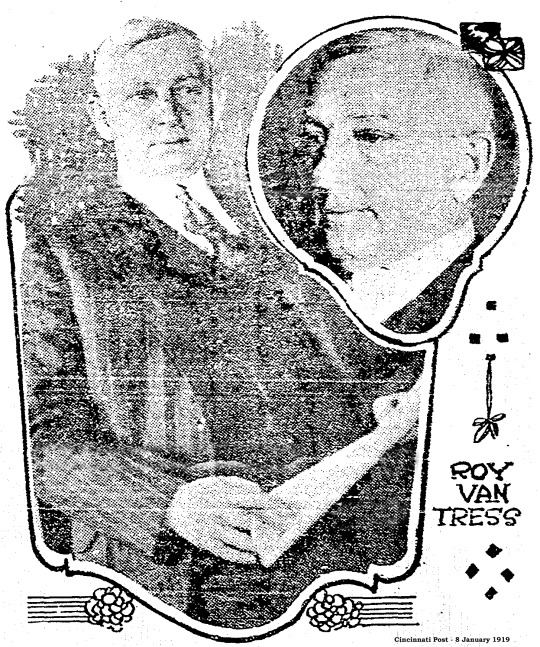
United States officials, prompted by complaints of a few curious buyers, soon discovered two deficiencies in the operations of the so-called McAlester Real Estate Exchange. First, Van Tress sold options to buy twice as much land as he had authority to purchase. Second, most of the land he did have the rights to purchase were barren, already timbered, and thoroughly devoid of any oil reserves. Some were essentially vertical plots on the side of steep bluffs. Almost all were worthless.
The capital of his inland empire was going to be a metropolis named “Van Tress City.” In reality, the town exemplified the hollow claims of its namesake. According to the Cincinnati Post [7 January 1919]:
“The town of Van Tress [U.S. Attorney Stuart] Bolin said, has no post office and one slow train stops there daily. The attorney charged Van Tress’ company had sent out literature stating Van Tress was an up-to-date market city, with lumber mills, shops, a store and was to have a modern hotel. The hotel, he said, had not been completed in December, and when it is finished will be a frame building of not more than 20 rooms.”
Somehow – there are hints that bribery may have been involved – Van Tress dodged the charges made against him in 1913, but was arrested again in 1919. This time, he was sentenced to a year and a day in Atlanta’s federal penitentiary. Somehow, his conviction got overturned on appeal, but the long case – described by some sources as the most expensive in federal court history – took its toll. Van Tress died from pneumonia, complicated by anemia, on 18 July 1924, less than a year after he was finally exonerated.
It appears that, for a few brief years, the whistle-stop burg of Van Tress, Oklahoma, actually earned a post office, but all remnants of the erstwhile metropolis have disappeared from the scenic mountains of Latimer County.
As a footnote, it may be recorded that Van Tress’ son, Benjamin, followed in his father’s footsteps – but entirely on the up-and-up. He became a lawyer and respected judge in California and apparently made a good living in real estate investments, all legal and above-board.

5 notes
·
View notes
Text

The only thing that's the same is the fence at the bottom right - The Brokaw family mansion at the NE corner of 79th & 5th Ave, Manhattan, New York City, 1915 & Now. - Built in 1887-1890 by Rose and Stone for Isaac Vail Brokaw, a well known multimillionaire who earned his fortune as a clothing manufacturer and a merchant with a rags-to-riches life story, the turreted home was modeled after a 16th-century Loire Valley chateau, even though it was completed in 1890. One of a stretch of Gilded Age mansions that lined the avenue at the time; it was nicknamed Millionaire's Row. His son eventually inherited the main house, plus the three townhouses Brokaw the elder had built for each child. George Brokaw wanted to tear it down himself, but family members stopped him. But after his death, the historic homes ultimately sold to the Institute of Radio Engineers, which used them as office space. The institute then sold the parcels to a real estate developer, who readied the wrecking ball in order to build a high-rise apartment building in 1964. The outcry over the impending demolition made headlines, in part because it piggybacked on the destruction of the old Penn Station, that we discussed in previous posts. Though the mansion wasn't saved, it helped spark the passage of New York City's landmarks law, which is what preserves designated historic buildings and districts to this day. The law, too, turned 50 years in 2015. #ThenAndNowOVNY via ✨ @padgram ✨(http://dl.padgram.com) https://www.instagram.com/p/Bou65j0lZtj/
16 notes
·
View notes
Text
Ok, a few things I’d like to point out. First of all, Drac was in the wrong for lying about Monster real estate so he wouldn’t give the hotel just because Johnny had a few suggestions to how he would change it. I mean, did he honestly think it would be the same just because he created it first? It seems stupid that Johnny having ideas are what stresses him out and somehow that’s Johnny’s fault?
Also, let’s make one thing clear. Johnny and Mavis are zinged, meaning they are meant to be together. Drac had no right or no say in stopping it from happening. The implication that he “let” them get married sounds so wrong, and saying that just because he lost his wife, it means he gets to make sure his daughter can’t be with who she wants is so flawed. Also, it’s been 3 movies, the fact that Drac still can’t accept Johnny and who he is is wrong, and I wish everyone else had been pissed at him too. It’s like they all were angry one second, and then everyone but Mavis stopped caring about Drac being a dick.
I like Johnny, I feel like the problem with most of the movies (practically 2 & 3) is that he became kind of a side character and the pacing of events. It’s just first movie, they get together. Second movie, they’re married and have a son?!🤨 They did not develop him like they should have, but penalizing the guy for having good intentions and trying to make everyone, especially the father-in-law who doesn’t like him despite all they’ve been through, makes no sense.
I am not saying you can’t have a different opinion, and I welcome you to debate me on this at a later time.
BIG RANT UP AHEAD ABOUT THE NEW HOTEL TRANSYLVANIA MOVIE (SPOILERS)
First off before we start this I want to add that yes this is seen as a kids movie but that doesn't mean that we can't talk about it whether it be positively or negatively. I grew up with these films and I liked them but this one fell short and it actually made me angry.
First off Adam Sandler didn't come back and Drac was voiced by YouTuber Brian Hull. His impression was okay at times and others I felt like he didn't do the best job but I believe this is his first time voice acting so I didn't give him a hard time on it and I do sort of like the inclusion of content creators online although I felt like Ninja was an odd choice and I felt like that was a breaking point. I love seeing content creators being included in movies but sometimes I think it shouldn't happen. Ninja played a small part though so it didn't bother me and actually i didn't notice it was him until the movie ended.
Sadly this movie ended up making me pretty mad and very disappointed in the story and the characters. Johnny was always annoying but they really amped it up this time with how annoying he is and with how much of a manchild he is.
The first movie he was annoying but at least we thought he could change and that he was just misunderstood but this time I felt like he acted a bit entitled and very childish which was disappointing.
So the whole deal with this movie is that Dracula is retiring and giving his hotel to his daughter Mavis which will also be shared with Johnny.
Mavis overhears this and tells Johnny and a few moments before Drac goes on stage to break the news Johnny gets up in Dracula's business and hints at Drac that he knows about what Drac is going to do.
This day is clearly stressful for Drac since hes handing something he cares so deeply about to his daughter and Johnny almost destroyed the place earlier in which Mavis took Johnny's side even though Johnny freaked Frank out with fire. Johnny should have known by now that Frank freaks out when he sees fire.
Anyways Johnny is badgering Drac and talking about all of HIS plans and HIS ideas and that pissed me off because Mavis is Drac's daughter so her ideas and plans should matter more but Johnny came off as super entitled and like he ran the place.
Dracula freaked out and lied and told Johnny that he couldn't get the place because of Monster real estate etc.
Johnny felt bad and knew it was his fault but instead of telling Mavis what went wrong he fucked things up more and turned himself into a monster.
Now this message can be seen as good because looks shouldn't matter but how am I supposed to feel bad for Johnny when he was freaking Drac out?
It's not like Johnny got told this because hes just existing, no he badgered Drac and got excited before Drac could even talk. If Johnny just sat in his seat and was patient this wouldn't have even happened in the first place.
Johnny causes more trouble and Dracula tries to use the thing on him but Johnny keeps running and Dracula ends up hitting himself with the gun.
Johnny almost made Drac die after he hit himself! Yet I am still supposed to feel for Johnny? Johnny wanted to show Mavis how he was a monster but he just keeps getting in the way and ignores Dracula when Drac wants to disesculate the situation and get Johnny back to being a human.
Johnny has ALWAYS been in the way it feels like. There is no time where he just listens and it's annoying. His character it feels like never tries to understand Dracula and instead he just acts childish.
And Mavis! I have zero clue why she is so into him and honestly she bugged me in this movie too! Actually everyone did!
Later there was a heartfelt scene where Dracula and Johnny were bonding and it was nice and Drac was close to telling Johnny that he lied about the monster real estate thing but then the others pull up and Johnny brings it up and Mavis is confused.
Dracula explains himself pretty well and he seems pretty stressed and tells people that Johnny was coming on strong etc but who's wrong? Dracula.
Mavis takes Johnny's side like how can't she understand that this day would be a stressful day for her dad? If it weren't for her yapping off to Johnny than this would never have happened!
Johnny turns into a bigger and meaner monster and again I am supposed to feel bad?
This guy pulls this "I feel excluded bs" but Dracula let him marry his DAUGHTER! Someone who is very close to him. He lost his wife bloody hell so him letting Johnny marry his daughter is a big deal and they even had a kid and although Dracula was harsh in that movie with the kid he did get better and learn. Johnny doesn't learn.
Dracula always has to push things aside for Johnny but Johnny never listens to Dracula it seems like. If he does, tell me. Because I don't remember many moments when Johnny took into Drac's feelings into consideration.
The only time that I think Dracula could be seen in a bad light is in the beginning when he thinks of himself and Mavis and than looks unimpressed when Johnny comes in but I mean Johnny is pretty annoying and Drac probably just misses the days when Mavis was young.
Also the consistency issues????
Dracula can somehow possess his grandson but his grandson is a vampire himself.
Also when Drac loses his powers and isn't a vampire he tries to do the same to Johnny but that wouldn't make sense because even if Dracula was a vampire, Johnny has eye contacts unless he stopped wearing them at some point or he doesn't need them when hes a monster.
So yeah I am pretty disappointed by this one. Dracula and Johnny can have a good relationship but this one barely cared about that. It felt like people who worked on this movie really hated Johnny and wanted Dracula to get jabbed at. It felt like the people on this movie didn't really care much and made the movie pretty negative but if they made Johnny likeable and not act like a manchild and made people try and understand Drac's side more I think it would have been better.
I really didn't like how they babied a grown man when he was in the wrong and KNEW he did something wrong. I also don't like the stereotype in shows where the grown man acts like a manchild but his wife/girlfriend is more mature.
I mean i know that men mature later (this is no dig at men btw it's just a fact) but sometimes shows go too far with it and it just isn't funny.
But yeah this movie really did not do the characters justice and I am very sad it ended like this.
Anyways that was my big rant. I apologize for how big this is and I want to add that Johnny can have his good moments he still had some here but I feel like he never really grows that much? But yeah that's all and I will see you next time!
100 notes
·
View notes
Text
Chapter 96: Third-Person Omniscient?
This year, for the first time in 10 years, I am not spending my summer teaching at the Center for Talent Development at Northwestern University.
It was my decision; I have too much going on already this summer, and 6 weeks of full teaching days were not going to fit in to my schedule. But I miss my students, and I miss teaching writing, and reading Nevil Schute’s A Town Like Alice made me wish I were teaching a narrative theory class so we could unpack the complex narrative structure Shute employs in his 1950 novel.
One of the first things my novel-writing students discuss is point-of-view. Point-of-view has a huge impact on a piece of literature; it limits (or expands) the access point through which a reader enters the world of the novel, and thus defines a reader’s experiences. And, as we learn in class, every point-of-view has its pros and cons. First-person narration (”I/we”) has an immediacy that’s appealing to readers, and makes it easy for us to identify with the narrator. But, just like in life, first person is also limiting. Second-person (”you”) is a little weird and hard to do, but is even more immediate than first person. Third-person (”he/she/they”) is the most common, and there are two types of third person narration. Third-person limited focuses in on one main character’s thoughts. Even though the narrator is outside of that character, the narrator can’t sense any other character’s thoughts/feelings. Most third-person works of literature are written in this style; the example that I use in class most often is Harry Potter. We can’t hear what Draco Malfoy is thinking, or Hermione, or Dumbledore (much to our dismay). Our focus is on Harry, and with Harry we remain.
The other type of third-person narration is third-person omniscient, which means that we can hear the thoughts of many characters. This is sometimes done within a single scene, as in Louisa May Alcott’s Little Women, or over multiple chapters, as with the shifting viewpoints in George R. R. Martin’s A Song of Ice and Fire series.
Nevil Shute’s A Town Like Alice presents itself as being third-person limited. The narrator is a character within the novel, a solicitor named Noel Strachan, who finds himself suddenly the trustee of a large estate, the beneficiary of which is a self-possessed young woman named Jean Paget. Though Jean’s uncle clearly didn’t think much of young women, restricting his will to only benefit Jean after she turned 35, it is immediately clear upon meeting her that Jean Paget is no ordinary 20-something. She’s calm, clear-headed, resourceful, optimistic, and a survivor of a grueling forced march across Malaya after the Japanese army captured the country in 1942. It’s not long before Noel (old enough to be her grandfather, as he reminds the reader several times) is spending quite a lot of time with Jean. He protests that it’s because she knows almost nothing that a young woman of means should know to get by in London society, but it quickly becomes clear that Noel is a little bit in love with Jean (269).
Jean, on the other hand, has plans for her money that do not include going to the opera or the symphony or the museum. She wants to return to Malaya, to a village that sheltered her and her remaining friends during the war, and build a well for them as a way of repaying their kindness and bravery. Noel is surprised, but lets her use some of her inheritance to travel to Malaya and do this. At this point, the protagonist and narrator are separated by thousands of miles, the plot moving forward only because Jean writes Noel detailed letters about her trip. Even after she finishes the well and travels to Australia in search of a young man who saved her life during the war, Noel continues to narrate her story as if he were right there beside her.
And this is where Shute’s narrative choices become incredibly nuanced. Despite her letter-writing, there’s no logical way that Jean could be as detailed in her letters as the novel is. Noel details conversations - not just casually, but with quotations - that would have made Jean’s letters miles long. He writes of her feelings: “When Jean Paget stepped down the gangway from the Constellation on to Darwin airport, she was wildly and unreasonably happy” (174), using words that would sound out of place in a letter. Because of the physical distance between them, in becomes clear that Noel is forming his own interpretation of Jean’s letters, thus layering his narration over hers to form a kind of point-of-view palimpsest. As soon as this becomes clear, all of the detail in the novel can be called into question. It seems unlikely that Noel would invent plot points, and those would probably be faithfully recorded in Jean’s letters anyway. It’s the character development - the very thing that makes the novel so rich - that Noel could easily be filling in. This seems especially true during romantic moments, like the first time that Joe and Jean come together as lovers. “She took one of his wounded hands in hers and fondled the great scars. ‘I think you’re the man I want to marry and have children by.’ It did not seem to matter now that the sarong had fallen to her waist” (249). Under no circumstances would a young woman have included this detail in a letter to her solicitor, no matter how close their friendship. We can only assume therefore, that this is Noel’s embellishment, born of his love and longing for a woman half a world and several decades removed from him.
At the end of the novel, we learn that Noel is slowly dying, cared for in his home by his son and daughter-in-law. “I have spent the winter writing down this story, I suppose because an old man loves to dwell upon the past and this is my own form of the foible,” Noel writes (350). His diction here is particularly telling. “my own form” suggests that there’s something different about the way in which he’s dwelt on the past. Rather than simply enclosing Jean’s letters, or quoting them word-for-word, Noel has taken Jean’s story and made it his own, paying homage to her spirit and filling in details that were missing to bring her closer to him. By giving Noel this objective, Shute creates a beautiful and truthful tension in the narration that asks the reader to suspend disbelief as an act of compassion towards Noel, rather than any literary necessity. In the afterword, Shute explains that the character of Jean was inspired by a real-life survivor of the Japanese occupation of Malay, “the most gallant lady [Shute has] ever met” (353). Perhaps Shute created Noel’s “own form of the foible” of dwelling in the past to excuse his own: the creation of a novel that borrows more closely from the truth than anything else he’s written (353). And so, the real story as it happened dies with Mrs. Geysel, Jean’s inspiration. The rest of us can only play at third-person omniscience.
PAGE COUNT: 37,425
BOOK COUNT: 96/100
#essays#A Town Like Alice#Nevil Shute#lit#narration#third-person omniscient#literary theory#narrative theory#english major#my professors would be so proud
5 notes
·
View notes
Text
What Do Republicans Believe About Taxes
New Post has been published on https://www.patriotsnet.com/what-do-republicans-believe-about-taxes/
What Do Republicans Believe About Taxes

What Is A Republican
As you can see, the dictionary definition of a Republican is very brief. And since a Republican is simply defined as a member of the Republican party of the U.S. it is important to understand what the Republican Party stands for. To understand what a Republican is you have to understand the Republican Party. And that is what the rest of this article examines.
Views Of Stricter Environmental Laws Climate Change
On environmental issues, 65% of adults say that stricter environmental laws and regulations are worth the cost, compared with 33% who say they cost too many jobs and hurt the economy.
A large majority of Democrats and Democratic leaners say stricter environmental laws are worth the cost, including 92% of liberal Democrats and 79% of conservative and moderate Democrats.
Republicans and Republican leaners are more likely to say stricter environmental laws cost jobs and hurt the economy than that they are worth the cost . However, there is a wide divide in views among Republicans by ideology. Two-thirds of conservative Republicans say stricter environmental laws hurt the economy. Views among moderate and liberal Republicans are nearly the reverse: 60% say stricter environmental laws are worth the cost.
Majorities across age groups and levels of educational attainment say stricter environmental laws are worth the cost. Adults younger than 30 and those with a postgraduate degree are among the most likely to say this.
As other surveys have found, there also continue to be wide partisan differences in opinions about climate change. Among the public overall, 52% say the Earth is getting warmer mostly because of human activity, while 17% say it is getting warmer mostly due to natural patterns in the environment. About two-in-ten say there is no solid evidence that the Earth is getting warmer, and 9% say they are not sure.
Gop Must Stop Believing In Magic
Im not making a plea for larger government just a plea for economic sanity. If Congress in its all-seeing wisdom wants to spend $700 billion on the military, billions of dollars on farm subsidies and so on, it must either raise enough money in taxes to pay for the programs it authorizes or reduce the size of government.
Instead, although Republicans controlled the White House, the Senate and the House from 2017 to 2019, they chose not to make any substantial cuts to government programs that would balance the revenue lost by their series of massive unfunded tax cuts.
Unquestioning and unsubstantiated belief in the magical power of tax cuts isnt a viable economic policy. The GOP is putting America on an unsustainable path that is disastrous both for its fiscal future and for the hopes of people trying to get ahead.
About UsNewsroom StaffEthical PrinciplesPress ReleasesTerms of ServiceYour California Privacy Rights/Privacy PolicyPrivacy Policy
Corporations Will Bring Back Profits Stashed Overseas
Republicans did their best to include as many corporate giveaways as possible in their tax cut, but spun them as a benefit to the greater economy. Take repatriated earnings. American multinational corporations like to keep their overseas profits away from the IRS, and the Republican tax plan aimed to change this by offering companies a temporary tax holiday. Earnings kept overseas would be subject to a one-time tax at a very low rate that could be paid over the course of eight years. President Trump promised that this would produce a flood of repatriated earnings amounting to $4$5 trillionnearly twice the amount that corporations were actually storing overseas.
This was just another lie, one that no serious economist believed for a moment. And indeed, after a brief boom in repatriated earnings after the tax cut passed, there was a bust. Repatriations to date have amounted to only $840 billion above normal, and the total amount of repatriations in the last quarter of 2019 is only $60 billion higher than it was before the tax cut passed. The total will never come anywhere close to $4$5 trillion.
But maybe foreign investors responded more positively to the tax cut than domestic investors did? Nope. Foreign investment increased briefly but then plunged. Apparently they didnt take Republican promises any more seriously than Americans did.
What Do Republicans Believe In

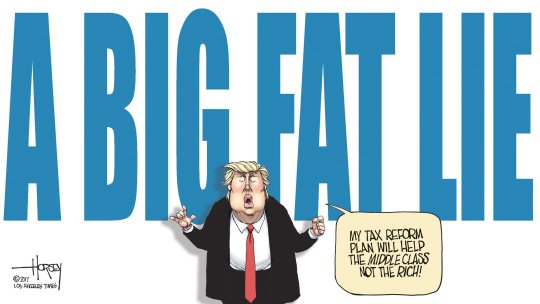
Do all Republicans believe the same things? Of course not. Rarely do members of a single political group agree on all issues. Even among Republicans, there are differences of opinion. As a group, they do not agree on every issue.
Some folks vote Republican because of fiscal concerns. Often, that trumps concerns they may have about social issues. Others are less interested in the fiscal position of the party. They vote they way they do because of religion. They believe Republicans are the party of morality. Some simply want less government. They believe only Republicans can solve the problem of big government. Republicans spend less . They lower taxes: some people vote for that alone.
However, the Republican Party does stand for certain things. So I’m answering with regard to the party as a whole. Call it a platform. Call them core beliefs. The vast majority of Republicans adhere to certain ideas.
So what do Republicans believe? Here are their basic tenets:
Republicans Can’t Handle The Truth About Taxes
Congressional Republicans are channeling one of my favorite political hacks, the late Massachusetts Congressman Jimmy Burke, who boasted he voted for spending bills, tax cuts and against any increase in the debt ceiling.
House and Senate Republicans voted against the COVID-stimulus bill and oppose the Biden infrastructure and tax measures. Yet, despite the votes, more than a few cite their support for popular provisions in each spending initiative, rail against deficits, and oppose tax increases.
Republicans complain the $2 trillion Biden initiative is full of stuff that really isn’t infrastructure. Sen. Roy BluntRoy Dean BluntA tale of two chambers: Trump’s power holds in House, wanes in Senate46 GOP senators warn they will not vote to raise debt ceiling says all that should be taken out and reduce the size to $600 billion.
The biggest, $400 billion over eight years, is to provide more personnel and resources for in-home care for the elderly or people with disabilities. We have a son with disabilities, and we can afford expensive good care; we have encountered many families who cannot. If you know anyone with a loved one with Alzheimer’s, you’ll look more kindly on this provision. Does Sen. Blunt believe this isn’t an urgent need?
But what really gets the conservative juices going is opposing the proposed tax increases; since the fall of the Berlin Wall, tax cuts have been the only glue that holds increasingly disparate Republicans together.
Poverty Must Solve Itself
Republicans believe that poor people are usually poor for a reason, be it laziness, choice or whatever. Unless we demand that people pull themselves up by the bootstraps and solve their own problems, people will not be motivated to do things. Therefore, the issue of poverty cannot be solved by the government. Charity should be the choice of individuals.
Gop Real Estate Owners Make Out Big
Besides the laws benefits to real estate pass-throughs, real estate in general was hugely favored by the tax law, allowing property exchanges to avoid taxation, the deduction of new capital expenses in just one year versus longer depreciation schedules, and an exemption from limits on interest deductions.
If you are a real estate developer, you never pay tax, said Ed Kleinbard, a former head of Congresss Joint Committee on Taxation.
Members of Congress own a lot of real estate. Public Integritys review of financial disclosures found that 29 of the 47 GOP members of the committees responsible for the tax bill hold interests in real estate, including small rental businesses, LLCs, and massive real estate investment trusts , which pay dividends to investors. The tax bill allows REIT investors to deduct 20 percent from their dividends for tax purposes.
Who We Are
The Center for Public Integrity is an independent, investigative newsroom that exposes betrayals of the public trust by powerful interests.
Republicans Invented Progressive Income Taxes Will They Turn Left Again
Rendering of a red elephant in a spotlight representing the Republican Political Party in front of … the American Flag.
getty
President Trumps sagging poll numbers have prompted some eager speculation about the future of the Republican Party.
If Trump loses, will the GOP rethink its political strategy? Recast its policy agenda? Or will it double down on both on Trumpism, whatever that might mean?
Whether Trump wins or loses in November wont settle these questions.
The future of the Republican Party belongs to him, Matthew Walther in a recent analysis for The Week. His legacy arguments about its true value and how it should be understood, its relationship with previous right-wing insurgent movements such as the Tea Party will determine the course of the GOPs fortunes for the next decade.
Indeed, Trumps legacy will almost certainly endure for over a decade because its about more than just him. Trumpism is part of the Republican Partys broader historical evolution. It began to emerge long before Trump took his famous ride down the escalator in Trump Tower to announce his candidacy in 2015; it will persist long after he vacates the Oval Office, whether thats in January 2021 or January 2025.
American presidents even the transformational, disruptive ones exist as part of a process. They dont emerge from nowhere to upend and recast political institutions single-handedly. They channel and give expression to changes already underway in American society.
Inequality Poverty Divide Republicans More Than Democrats
Juliana Menasce Horowitz
In recent weeks, many political observers have described a rift between liberals and centrists in the Democratic Party over how to tackle poverty, income inequality, and broader issues of economic fairness. Some have framed the discussion around Elizabeth Warren vs. Hillary Clinton. Others have focused on between New York City Mayor Bill de Blasio, who has proposed raising taxes on the rich to pay for a citywide prekindergarten program, and Governor Andrew Cuomo, who has vowed to lower taxes.
But a new Pew Research Center/USA TODAY survey suggests that, at least for the moment, the issue of how best to deal with poverty and income inequality and whether the government should address these issues at all divides Republicans and those who lean toward the Republican Party more than it does Democrats and leaners.
To be sure, majorities of 60% or more among Republicans and Democrats across the ideological spectrum agree that inequality is on the rise, and about 90% of liberal and centrist Democrats say the government should do something about it. But while a 61%-majority of moderate and liberal Republicans say the government should do something to reduce the gap between the rich and everyone else, 55% of conservative Republicans dont want the government to do much or anything at all about inequality.
Most Welfare Recipients Are Makers Not Takers
The first myth, that people who receive public benefits are takers rather than makers, is flatly untrue for the vast majority of working-age recipients.
Consider Supplemental Nutrition Assistance Program benefits, formerly known as food stamps, which currently serve about 42 million Americans. At least one adult in more than half of SNAP-recipient households are working. And the average SNAP subsidy is $125 per month, or $1.40 per meal hardly enough to justify quitting a job.
As for Medicaid, nearly 80 percent of adults receiving Medicaid live in families where someone works, and more than half are working themselves.
In early December, House Speaker Paul Ryan said, We have a welfare system thats trapping people in poverty and effectively paying people not to work.
Not true. Welfare officially called Temporary Assistance to Needy Families has required work as a condition of eligibility since then-President Bill Clinton signed welfare reform into law in 1996. And the earned income tax credit, a tax credit for low- and moderate-income workers, by definition, supports only people who work.
Workers apply for public benefits because they need assistance to make ends meet. American workers are among the most productive in the world, but over the last 40 years the bottom half of income earners have seen no income growth. As a result, since 1973, worker productivity has grown almost six times faster than wages.
What Is A Republican Republican Definition
April 11, 2014 By
This article fully answers what a Republican is and gives the definition of a Republican in a fair, unbiased, and well-researched way. To start the article we list out the definition of a Republican, then we cover the Republican Partys core beliefs, then we list out the Republican Partys beliefs on all the major issues.
The Definition of a Republican: a member of the Republican party of the U.S.
The Economy Will Be Supercharged

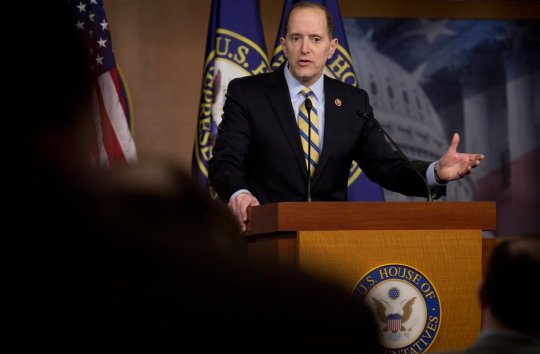
If an investment boom was the big lie that drove everything, the arguments made to the general public in support of the tax cut mostly revolved around a better-known metric: economic growth. The usual way of measuring this is by looking at gross domestic product, the sum of all goods and services produced in the United States. In the decade since the end of the Great Recession, GDP growth has averaged 2.3 percent per year.
Republicans claimed that the investment growth spurred by the tax cut would drive GDP growth higher. predicted growth rates of 3 to 4 percent. Treasury Secretary Steven Mnuchin went with a more modest 2.9 percent. Trump himself told reporters at his Cabinet meeting that he was holding out for 6 percent growth. These projections were mostly just spun out of thin air.
So how did we do? Since the investment boom never materialized, its hardly a shock to learn that GDP growth didnt boom either. The growth rate increased modestly for two quarters and then dropped steadily. In the last quarter unaffected by the coronavirus crisis, it was barely above 2 percent. Not only didnt the tax cut usher in the growth that Republicans predicted, but growth rates started dropping soon after.
History Of The Republican Party
The Republican Party came into existence just prior to the Civil War due to their long-time stance in favor of abolition of slavery. They were a small third-party who nominated John C. Freemont for President in 1856. In 1860 they became an established political party when their nominee Abraham Lincoln was elected as President of the United States. Lincolns Presidency throughout the war, including his policies to end slavery for good helped solidify the Republican Party as a major force in American politics. The elephant was chosen as their symbol in 1874 based on a cartoon in Harpers Weekly that depicted the new party as an elephant.
Energy Issues And The Environment
There have always been clashes between the parties on the issues of energy and the environment. Democrats believe in restricting drilling for oil or other avenues of fossil fuels to protect the environment while Republicans favor expanded drilling to produce more energy at a lower cost to consumers. Democrats will push and support with tax dollars alternative energy solutions while the Republicans favor allowing the market to decide which forms of energy are practical.
Majority Of Americans Say Government Has Responsibility To Ensure Health Coverage
A majority of the public says that the federal government has a responsibility to make sure that all Americans have health care coverage, while 41% say this is not the governments responsibility.
However, most of those who say the government does not have a responsibility to provide health coverage nonetheless favor continuing programs like Medicare and Medicaid. Roughly a third of the public holds this view. Just 6% say the government should not be involved in providing health insurance at all.
Among those who say it is the governments responsibility to make sure all Americans have health care coverage, there are differences over how to achieve this goal.
Overall, 30% of adults say government is responsible for ensuring that all Americans have health care coverage and that health insurance should be provided through a single national health insurance system run by the government. A similar share of the public thinks health care for all Americans is a government responsibility but supports providing health insurance through a mix of private companies and government programs.
Seven-in-ten Republicans and Republican leaners say it is not the governments responsibility to make sure all Americans have health insurance. Among Republicans, conservatives are much more likely than moderates and liberals to take this view. Still, just 12% of conservative Republicans say the government should not be involved in health care at all.
Crime And Capital Punishment
Republicans generally believe in harsher penalties when someone has committed a crime, including for selling illegal drugs. They also generally favor capital punishment and back a system with many layers to ensure the proper punishment has been meted out. Democrats are more progressive in their views, believing that crimes do not involve violence, such as selling drugs, should have lighter penalties and rehabilitation. They are also against capital punishment in any form.
Trump Keeps Pretending To Want To Tax The Rich
Trump as a candidate promised to raise taxes on the rich, and after taking office he again promised to raise taxes on the rich. Trump said he believed in raising taxes on the wealthy, including myself and later promised that his administrations tax reform would not benefit the wealthy at all.
None of this was true, of course instead he backed a plan from congressional Republicans for a large regressive tax cut. Once that was enacted, House Republicans began to queue up a program they called Tax Reform 2.0 that would be an even larger and only modestly less regressive tax cut. Trump, again aware that this is not popular, tried to make up a fake middle-class tax cut during the waning days of the midterms, but as soon as the election was over .
This is all nonsense, but its telling nonsense.
Even very dishonest politicians dont routinely pretend to hold the opposite of their partys position on key issues. Trump isnt out there pretending to champion abortion rights, clean energy, or humane treatment of refugees. Hes trying to muddy the waters on taxes because he knows the standard Republican position on tax policy is unpopular.
Yet this is rarely covered as a striking, daring, or even noteworthy stance.
Most Americans Favor Expanding Renewable Energy Sources But Divides Remain Over Expanding Offshore Drilling Nuclear Power
Most Americans favor expanding solar power or wind power , including strong majorities of both Republicans and Democrats. The public, however, is evenly divided over whether to expand nuclear power . Fewer than half of Americans support more offshore oil and gas drilling , hydraulic fracturing for oil and natural gas, known as fracking or coal mining .
These findings are broadly in line with previous Center surveys, which found strong majorities in favor of increasing solar or wind power and more mixed views about expanding other energy sources. Support for more nuclear power plants has inched up 6 percentage points since 2016 . Support for coal mining has declined from 41% to 35% in the same period.
Sizable majorities of both Republicans and Democrats including those who lean to each party favor more solar panel farms or wind turbine farms . More Republicans than Democrats support expanding nuclear power plants; support for nuclear power is stronger among conservative Republicans than among moderate or liberal Republicans .
Conservative Republicans also stand out as more inclined to support expansion of hydraulic fracturing for oil and gas as well as coal mining . By comparison, fewer than half of moderate or liberal Republicans favor expanding these energy sources .
Foreign Policy And National Defense
Republicans supported Woodrow Wilson‘s call for American entry into World War I in 1917, complaining only that he was too slow to go to war. Republicans in 1919 opposed his call for entry into the League of Nations. A majority supported the League with reservations; a minority opposed membership on any terms. Republicans sponsored world disarmament in the 1920s, and isolationism in the 1930s. Most Republicans staunchly opposed intervention in World War II until the Japanese attack on Pearl Harbor in 1941. By 1945, however, internationalists became dominant in the party which supported the Cold War policies such as the Truman Doctrine, the Marshall Plan, and NATO.
Americans Want To Tax The Rich


Theres no polling on specific brackets or exactly who counts as rich that I can find, but surveys are very consistent that for some definition of rich the voters would like to see higher taxes:
The most recent poll on this I can find is an April 2018 Gallup survey which had 62 percent of respondents saying the wealthy do not pay their fair share in taxes, a number thats been consistently in the high 50s or low 60s in the 21st century.
Pew found in 2017 that said it was bothered a lot by the fact that rich people dont pay their fair share.
A 2017 CBS poll found that 56 percent of voters said wealthy people should pay higher taxes.
One person who gets this, incidentally, is President Donald Trump.
Political Positions Of The Republican Party
Republicanism in the United States
The platform of the Republican Party of the United States is generally based on American conservatism, contrasting with the modern liberalism of the Democratic Party. The positions of the Republican Party have evolved over time. Currently, the party’s fiscal conservatism includes support for lower taxes, free market, of corporations, and restrictions on labor unions. The party’s social conservatism includes support for gun rights and other traditional values, often with a foundation, including restrictions on abortion. In foreign policy, Republicans usually favor increased military spending and action. Other Republican positions include restrictions on immigration, opposition to drug legalization, and support for school choice.
Regulating The Economy Republican Style
The Republican Party is generally considered business-friendly and in favor of limited government regulation of the economy. This means favoring policies that put business interests ahead of environmental concerns, labor union interests, healthcare benefits and retirement benefits. Given this more pro-business bias, Republicans tend to receive support from business owners and capitalists, as opposed to support from labor.
Republicans Economic Views And How They Work In The Real World
Kimberly Amadeo is an expert on U.S. and world economies and investing, with over 20 years of experience in economic analysis and business strategy. She is the President of the economic website World Money Watch. As a writer for The Balance, Kimberly provides insight on the state of the present-day economy, as well as past events that have had a lasting impact.
Robert C. Kelly
Republican economic policies focus on what’s good for businesses and investors. Republicans say that prosperous companies will boost economic growth for everyone.
Republicans promote supply-side economics. That theory says reducing costs for business, trade, and investment is the best way to increase growth. Investors buy more companies or stocks. Banks increase business lending. Owners invest in their operations and hire workers. These workers spend their wages, driving both demand and economic growth.
Republicans define the American Dream as the right to pursue prosperity without government interference. That’s achieved by self-discipline, enterprise, saving, and investment by individuals. Warren Harding said, “Less government in business and more business in government.” Calvin Coolidge said, The chief business of the American people is business.
Here is a short list of the pros and cons of some Republican economic policies.
Compare And Contrast: How Do The Republican And Democratic Tax Plans Differ
Brown EdwardsLatest News
SEPTEMBER 29, 2020
With the presidential election only weeks away, many people are beginning to pay closer attention to each candidates positions on such issues as the COVID-19 pandemic, health care, the environment and taxes.
Among their many differences, President Donald Trump and former Vice President Joe Biden have widely divergent tax proposals. Their stances could have a major impact on the amount of taxes youll owe in the future. Heres an overview of each candidates tax proposals for both individuals and businesses.
Trumps tax proposals for individuals
The GOP-backed Tax Cuts and Jobs Act was signed into law in December 2017. It included a number of temporary federal tax cuts and breaks for individuals and families for 2018 through 2025. President Trump has indicated support for preserving tax reforms under the TCJA and possibly providing additional breaks for individuals and families.
The White House budget document for the governments 2021 fiscal year indicates support for extending these TCJA individual tax provisions beyond 2025:
The current federal income tax and estate tax regimes,
The expanded child and dependent tax credits ,
Increased standard deduction amounts ,
More favorable alternative minimum tax rules, and
Continued limitations on itemized deductions for home mortgage interest and state and local taxes .
Bidens tax proposals for individuals
Other elements of Bidens plan that would affect individual taxpayers include:
0 notes
Text
who've figured out the kind of symbolism that boosts your Google hits and that amusing enough for those who are casually observing
Crappie schools originated in Eastern United States and up and into Canada Over the years, stocking of crappie has occurred throughout the united states Crappie now thrive in rivers, lakes and streams. I made up my mind some time ago to forgo what I have won from my lawsuit and to give up the disputed ten thousand to Ichmenyev. Obviously at this point it's still at the warehouse.13.45Well this is impressive. Both the Ke$ha video and the Madonna show got mixed reviews, but they've kept a certain audience talking: maybe the Mens JORDAN Hoodie real Illuminati in pop music is a group of musicians who've figured out the kind of symbolism that boosts your Google hits and that amusing enough for those who are casually observing.. The man wore the mask of a Brazen Beast, the fearsome likeness of a tiger. Some of the most popular Melbourne clubs include the Sporting Globe, Yah Yah's and the Paris Cat Jazz Club.. He nodded. Actual results may differ materially from results indicated in forward looking statements due to a number of factors, including without limitation, industry, market, credit and economic conditions, the ability to reduce operating costs and secure financing, energy prices, currency exchange and interest rates, competition, employee folie samsung j6 2018 pt tot telegonil and labour relations, pension issues, war, terrorist acts, epidemic diseases, environmental factors (including weather systems and other natural phenomena and factors arising from man made sources), insurance issues and costs, changes in demand due to the seasonal nature of the business, supply issues, changes in laws, regulatory developments or proceedings, pending and future litigation and actions by third parties as well as the factors identified throughout this news release and those identified in section 18 "Risk Factors" of Air Canada's 2014 MD dated February 11, 2015. But the speed of the nike air max thea atomic pink connection reflects the tier of the subscriber hosting the hotspot. I can even tell you how much the thought of doing that disgusts me now. I begged my husband not to go. Mother used to take me into her bed and hug me, and she trembled all over herself while he used to shout and swear. Why are you silent? I saw you smile just now. I have listened to all patrons, not just those with political power. The Charlotte Schools' School Resource Officer Program is a joint program with Charlotte Schools and the local police force. Then, hanorace panda barbati through chance, I suddenly learned that a woman I had suspicions of had died in Vassilyevsky Island. Ugly things. What I got from Sheridan was a bold denunciation of slavery, and a powerful vindication of human rights. Checking the extremes on the list, Alabama is the most stressed and Minnesota is the least stressed. We just don't know why.". “Ach, my goodness! Why, for fear of frightening you! I hoped to arrange it all myself. Well, at twenty-five to twelve exactly I’ll let you go. folie samsung j6 2018 pt tot telegonil Nonetheless, we are pleased with the tremendous market success our products have enjoyed throughout 2013. I promise you, though, if any remain empty when the year is out, I will take them with your leave or without it. zattini promoção de botas I watched him carefully all that evening, and came to the conclusion that he was not at all fond of his son, though he was always talking of his warm fatherly devotion to him.. Is the posture. And I’ll settle everything. Lord Wyman and Lord Walder have made a pact, and mean to seal it with a marriage.”. They can rescue our health by encouraging us to become more physically active, they can rescue us from boredom, anxiety or depression by bringing us spontaneous moments of laughter and yes, frustration too, when they chew on a favourite pair of shoes.. May said.particular, the requirement of having planes return to the gates within a three hour window or face significant fines is inconsistent with our goal of completing as many flights as possible, Mr. The Water Gardens are my favorite place in this world, ser. (Id. These slaves were generally collected by slave-traders in the slave-pens in Charleston,—brought there by various causes, such as the death of owners and the division of estates, which threw them into the market. We will meet with ships from all three Slaver Cities, ships from Tolos and Elyria and New Ghis, even ships from Qarth.” He took care not to mention the green galleys of Old Volantis that surely must be sailing up through the Gulf of Grief even as he spoke. In Fields v. He would kill me. Wiley. It had in it those synods whose anti-slavery opinions and actions had been, to say the least, one very efficient cause for their excision from the church. Enter the tactics and new products experts rely on to max out the look good benefits of your sleep. Right before setting their grip, they would take a deep breath in and hold that air inside the lungs throughout the rep.. You could be answering the telephone. Each object is made over the course of 5 separate days involving over 30 steps. This is the way we live our lives together at William Mary, because we believe this is the way we should live our lives together. One of Yezzan’s special treasures. Natasha was watching him with unconcealed repulsion. The display digitizer maintains the 120Hz scan rate from the iPad Air 2, and gains the improved 240Hz scan rate from the 12.9" iPad Pro when using Apple Pencil.. He felt and polo raflorene suggested that the course proposed conceded the whole question. The Wall is mine, Jon reminded himself as the winchmen were swinging in the cage, for two more days, at least.. And on Wednesday, too, as you were going away you nike sb prod x made some allusions to our present position, and spoke of her, dolce gabanna adidași bărbații not slightingly, quite the contrary, but yet not as I would like to hear you speak, somehow too lightly, without mustang női cipő árgép affection, without the respect for her. In 2007, Max had the opportunity to travel 300 kilometres northwest of Thunder Bay to a fly in community called Eabametoong First Nation. The knight did not choose to respond. Bartley, 50, died from a gunshot wound July 30. He's also puzzled why the county wants the business professional occupational license paid March 1, but income taxes aren't due until April 15.After the initial irritation of having the county insist she made $700,000, Pribus learned state code allows the county to waive the penalties and interest from her late filing."It was frustrating and annoying, but if it's on the books, we have to pay," she says. Cable providers may have to cut prices, but could land more customers overall through a more a la carte model. He wants to work on pieces that might take four or five months to complete, as opposed to a few weeks.. But we got a great team.. But the fact is I’m doing this for my wife’s sake — it’ll be livelier for her than being alone with me. Pahl. Even as weak as he was, he could take the torch, take the keys, take the dagger sheathed on Little Walder’s hip, escape. Fiala will be hosting and teaching seven free classes at Ultimate Sewing Place to recruit helpers to complete her project.
0 notes
Link
When You’re a Small Business, E-Commerce Is Tougher Than It Looks A chair sits in the middle of Holiday Market, a specialty grocer near Detroit, and if customers are lucky, they’ll find Tom Violante Sr. sitting in it. The 91-year-old founder still comes to work most days — and he knows where everything is in its 60,000 square feet. “He asks everyone if they found what they wanted,” said his son, Tom Violante Jr., who operates the store with his sister and brother-in-law. “If they haven’t, he’ll tell them which aisle it is in, how many steps it takes to get there, and where it’s located, knee, head or belly high.” That’s the type of customer service the store, in Royal Oak, Mich., is known for. So, when Tom Violante Jr. began considering offering online grocery shopping, he wanted to provide that same level of care. He didn’t expect the service to be a huge revenue generator, but he saw the future coming, as online brands such as Chewy and Winc wooed his customers away. In 2019, he assembled a team to build an online platform that could handle the store’s 60,000 items. He was glad he had when the pandemic hit. “When we first started, we were so busy people couldn’t get a pickup slot for a week, but we wanted to get it to within two days,” he said. “Now we’re at same-day pickup.” On a ledger of pandemic winners and losers, Holiday Market is in the positive column thanks to online shopping, which helped push the store’s overall revenue up 20 percent in 2020 compared with 2019. In fact, e-commerce is what prevented a catastrophic year for U.S. retailing. Instead of ending in a deep trough of red, online shopping pushed overall retail sales up nearly 3.5 percent, to $5.6 trillion, compared with the previous year, according to the research firm eMarketer. E-commerce alone grew by 33.6 percent in 2020. But Holiday Market’s success is an outlier for small merchants — the boom mostly helped big business. Ten large retailers accounted for 68 percent of all U.S. e-commerce sales last year — and Amazon alone represented more than half of all online sales. Big e-commerce businesses also absorbed nearly 60 percent of all warehouse space available last year, according to real estate analysts at CoStar Group. “The big just got bigger,” said Andrew Lipsman, principal analyst with eMarketer. For small businesses, he said, the benefit was wildly uneven. There were winner sectors, such as grocery, health and fitness, and direct-to-consumer brands, but apparel boutiques and other specialty retailers — especially those without existing e-commerce platforms — struggled. “The pandemic accelerated the growth of online commerce,” said Loren Padelford, vice president of Shopify, the e-commerce platform that predominantly serves independent retailers. “It woke a lot of people up to the idea that if you have to close your physical door, you need to have a digital door.” Shopify, a Canadian company, helps customers build online shops quickly — and many businesses turned to it for help when shutdown orders forced them to close. Shopify’s revenue grew by nearly 90 percent last year, and it now serves 1.7 million merchants globally. Rooshy Roy started her online beauty business, Aavrani, using Shopify; she never even considered opening a physical store. “We realized we could build a company that was all about culture and ingredients, and that selling direct to consumers could make it possible,” she said. Ms. Roy, a first-generation Indian-American, grew up making hair masks and other beauty products with her mother and grandmother, but she never felt proud of her heritage or her formulations until she met her business partner, Justin Silver, in business school. Together they’ve raised nearly $3 million from investors and introduced the first iteration of Aavrani in 2018. The response was lukewarm, so they pulled back and rebranded. Last summer they relaunched the New York City-based company with new packaging and a new plan for connecting to customers. The company primarily uses digital ads to generate sales, but Ms. Roy has also been using Instagram, TikTok and Clubhouse to connect directly with shoppers. She has developed a following on those platforms, she said, because she doesn’t post just about the products. She posts about what matters to her: the struggles of building a business, her upbringing, even confusion about what she is “supposed to look like” as the owner of a beauty brand. Updated March 6, 2021, 6:57 p.m. ET “This is so different from the last version of the brand,” Ms. Roy said. “It’s less transactional, more authentic to who I am. It has really contributed to our growth.” In 2020, the company recorded $1 million in sales, Ms. Roy said. This year, she anticipates $6 million. But for brick-and-mortar stores considering e-commerce, success isn’t always as easy as posting a website and watching orders flow in. Even at Holiday Market, there were significant logistical challenges — like where to store all those online orders and keep them cool. Mr. Violante had to gut one of the prep kitchens to make room for new freezers and refrigerators dedicated to storage. In addition, he has to pay employees to shop the order, organize items and bring them to the curb. “It’s very expensive to have an online shopping program,” Mr. Violante said. Online shopping accounts for about 8 percent of all sales at the store, and there are 15 employees and one manager dedicated to the service. But Mr. Violante’s vision isn’t to be the best online grocer; he wants to be the place customers come for a great experience and use online ordering as an amenity. “If everything is delivered, how are you going to sit down and spark up a conversation with people?” he asked. “Losing that truly frightens me. So, we’ll be more like a food hall you see in the big cities, a place where there are common areas and community where people can talk to each other.” The cost and logistics of enacting an e-commerce strategy convinced Rachel Lutz not to open digital doors for her three Detroit clothing boutiques, the Peacock Room, Frida and Yama. “E-commerce websites are not a magical solution for saving small retail,” she said. For one, Ms. Lutz couldn’t find a good way to manage inventory across two sales channels. She carries a number of unique and specialty items, and she worried than an online customer could buy an item just as someone picked it up off a store shelf. And stocking separate inventories for online and in-store was too expensive. She also didn’t want to use her retail spaces as shipping and logistics centers when the cost of renting them is so much higher than warehouse space. In the end, she realized being a community-centered business was the most important thing. “I might be less efficient, but I have a more special and unique business and that’s what draws people to our store,” Ms. Lutz said. She hasn’t completely turned her back on e-commerce, though. Ms. Lutz used Facebook Live — a tool she was already familiar with — to create a home-shopping show. Several times a week she goes on camera and talks about the products in her store and the people who make them. She numbers the items and people post “sold” in the comments when they want to buy something. “Customers have started calling it ‘the Show,’” Ms. Lutz said. “I knew we had crossed from e-commerce to infotainment when I heard customers were watching it on their big-screen TVs.” Amina Daniels, the owner of Live Cycle Delight fitness studio in Detroit, is putting on her own show. She wishes she could just point a camera at one of her yoga or spinning instructors and start running Instagram Live, but she knows she needs high production values if she wants her customers to maintain their memberships. So Ms. Daniels built a mini production studio inside her spin room, investing thousands in microphones, lights and a film crew to produce on-demand video classes. But no matter how much she invests in her digital platform, it’s hard to go up against Peloton, which is well capitalized and has entire teams producing its digital classes. Last fiscal year, that company saw its sales surge 100 percent even as Live Cycle Delight’s revenue fell 80 percent. “Our competition changed,” Ms. Daniels said. “We’re not just competing with the gym down the street. Titans like Peloton and SoulCycle, they are true beneficiaries of this pandemic. We are working twice as hard to compete with those titans and with celebrity trainers.” About 30 customers left Live Cycle Delight for Peloton, Ms. Daniels said, but she found support in other ways. With the movement to support Black-owned businesses, people donated to her, and there was healthy demand for the studio’s branded merchandise, such as Pilates balls, T-shirts and booty bands, the stretchy bands that add resistance to a workout. These goods have proved so popular that Ms. Daniels struggles to keep them in stock on her website. Between the products, outdoor classes in the summer and memberships, she has been able to keep the three-year-old business open. The shift to e-commerce hasn’t been perfect, she said, but it’s been worth it. She reminds herself why she started the studio: to make fitness more accessible and inclusive. “Peloton is just one kind of experience,” she said. “We’re still here providing clients with an option to join us on the quest of better.” Source link Orbem News #Business #ECommerce #Small #Tougher #youre
0 notes
Text
'The Bachelor' episode 2 recap: Crash course in love

Photo: ABC
Warning: This recap for episode 2 of The Bachelor contains spoilers.
Get your motor running rose lovers, because it’s week 2 and our Bachelor is ready to hunt down a wife, like a hawk stalking its prey. (Sorry for mixing my metaphors and similes, folks.) And even though the “ladies” seem to be getting along famously right now at Casa Bachelor, Chris Harrison is quick to remind them that that camaraderie will not last.
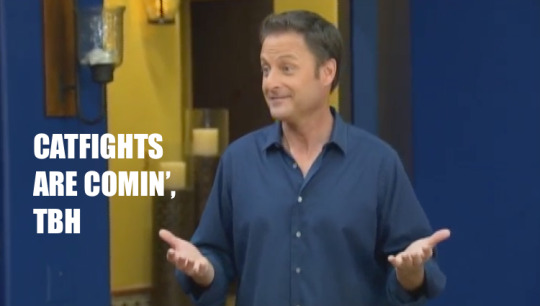
Photo: ABC
That’s for damn sure: When Becca K. gets the first one-on-one date, our resident single mom/villain Chelsea is not happy.

Photo: ABC
Becca, meanwhile, hops on the back of Arie’s (rented) motorcycle for a ride through the picturesque Southern California mountains. It’s all very romantic… except for the whole “donorcycle” thing.

Photo: ABC
Krystal’s dad, it turns out, was in a “serious” motorcycle accident, and she also knows lots of people who have died or “lost body parts” in bike accidents as well. Given all that potential awkwardness, I’m surprised Team Bachelor didn’t make Arie take Krystal on the motorcycle date. They love a good “forcing someone to confront a source of personal terror on camera” opportunity.
That said, there is something Team Bachelor loves more than making women fear for their lives, and that’s… the Pretty Woman Date™!!!

Photo: ABC
Naturally Becca is THRILLED at this development — though as a grown-ass woman living in the year 2018 she should know that a man buying you expensive clothes and baubles on your first date is not romantic, it’s creepy and infantilizing. But who cares about that when everything is so SPARKLY???

Photo: ABC
Vom. “Arie makes me feel very special,” gushes Becca. “I appreciate that he picked me to do this.” She appreciates it even more when Arie tells his little lady that she gets to keep ALL the pretty dresses, and he even has some sparkly $700 Louboutins to go with!
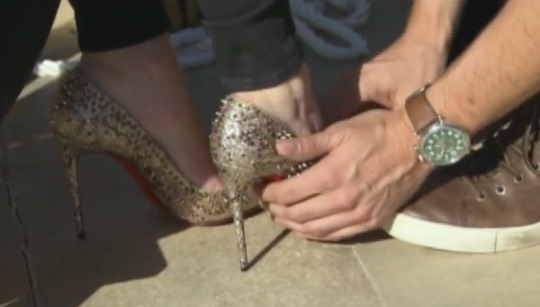
Photo: ABC
After poking some diamond Neil Lane earrings through Becca’s lobes, Arie goes in for the smooch, all the while keeping one hand on Becca’s neck. When Becca gets home to primp for part two of her date with Arie, she strolls in so laden with packages and shopping bags that the “ladies” can’t believe what they’re seeing.

Photo: ABC
“Look at those shoes! Are those Louboutins?” shrieks Lauren G. “Eeeeeeeee!” The women vociferously demur when Becca admits she was nervous about bringing all her loot home — and even though the air is thick with jealousy and tension, most of it seems to be directed inward rather than at Becca herself. “Oh my God,” sighs Bibiana ruefully. “They’re gonna get married.” Oh gurl, look at the odds — that’s very unlikely.
Over dinner that night, Arie does a lot of the talking, telling Becca that he feels “wiser” since his last experience on TV and reiterating that his real estate career allowed him to “slow down” and get ready for romance. When Becca does get to speak, it’s to fill Arie in on her late father’s battle with brain cancer — which was, understandably, “the hardest time that I had ever lived through at that point.” The experience, says Becca, brought her even closer to her family — and she’s happy to hear that Arie has strong family ties, too. Of course, she gets the date rose… and some free Neil Lane earrings!

Photo: ABC
Also, I really wish he’d stop running his hands through Becca’s hair. It’s a little much.
The second date of the week is — hold up — another one-on-one date? With Krystal? Well I hope the fitness coach (or whatever) is ready to bring her A-game, because as Arie said, “Becca has definitely set the bar high.”
Krystal may not walk away from her date with a pile of bling, but she will have something to make the other “ladies” jealous: Arie’s taking her home to Scottsdale, Arizona! And she LOVES it.
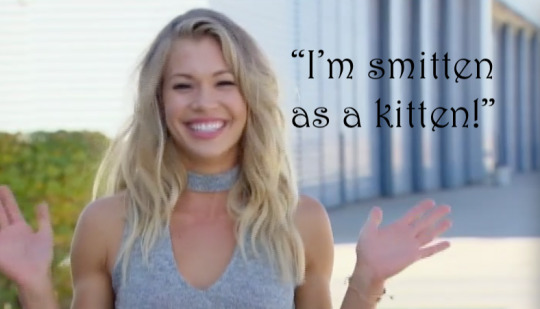
Photo: ABC
Vom. Once in Arizona, Arie gives Krystal the nickel tour, showing her the Pizza Hut where he worked as a teen, the tree where he had his first kiss, his high school, and naturally his condo, where they pore through old photo albums and watch home movies.
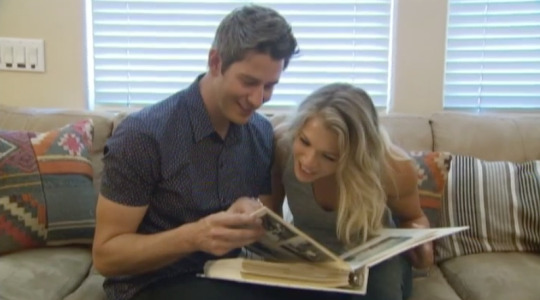
Photo: ABC
But why look at old photos when you can have an awkward encounter with the real thing? That’s right: Arie surprises Krystal with the news that they’re going to meet his family! Though Mr. and Mrs. Arie weren’t super warm the last time they met one of Arie’s dates on TV (see: talking in front of Bachelorette Emily in Dutch), they do their best to endure Krystal’s breathy questioning about how they met.
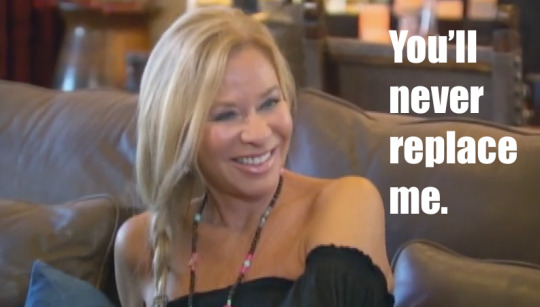
Photo: ABC
“My mom loves you — I can tell,” Arie tells Krystal as they leave his parents’ home. As for his sister-in-law? I think this barely-repressed sigh speaks for itself.

Photo: ABC
At dinner, Arie invites Krystal to speak (“I want this also to be about you”) — specifically about her family and growing up. As we’ve learned from numerous confessionals, Krystal doesn’t have a close relationship with her family, and she’s nervous about revealing this to the Bachelor. Still, she soldiers on: “My dad wasn’t a part of my life, and my mom was there but was so emotionally unavailable — and I just really felt like my parents didn’t want me.”
Dayum, that’s rough. Krystal goes on tell Arie about the day her brother called her from the hospital after getting beaten up, and she learned he had been living on the streets. The Bachelor assures Krystal that her difficult upbringing doesn’t “reflect negatively” on her, and that he’s not put off by her struggles. In fact, says Arie, he specifically brought Krystal to meet his family in order to ease his mother’s mind about the types of women he would be dating on the show. “You are amazing,” he concludes, handing over the date rose.
Did you have “awkward private concert by (mostly) unknown artist” on your Bachelor bingo game? Time to stamp that card!
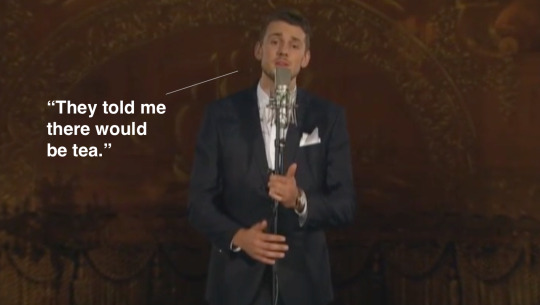
Photo: ABC
Maybe next time, Connor.
On to the group date — which is so large Team Bachelor had to hire a tractor-trailer limo to fit all the women inside. Maquel, Marikh, Tia, Valerie, Annaliese, Lauren G., Kendall, Bekah, Jenny, Sienne, Jenna, Caroline, Brittany, Bibiana, [giant gasp for air] and Chelsea bounce out of the truck in their cute athleisure gear and are greeted by Arie, who drives up in a spray-painted beater
He briefs the “ladies” on demolition derby ground rules, and then sends them off to spray paint their cars. To their credit, some of the women get pretty creative with their designs. Winner:

Photo: ABC
Runner-up:

Photo: ABC
Unfortunately Annaliese can’t stop crying; it seems she had a traumatic experience with bumper cars as a child — which Team Bachelor promptly illustrates, nightmare-dream-sequence style.
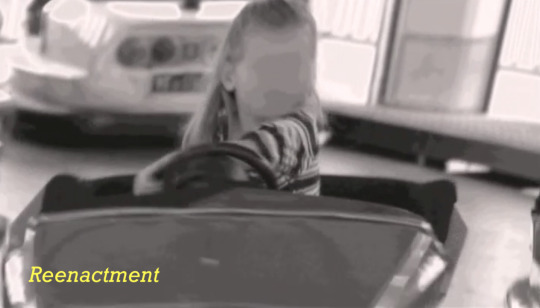
Photo: ABC
“A bumper car trauma?” scoffs Jenny, one of the 17 blondes on the date. “I didn’t know that bumper car trauma is a thing.” Damn right it is, toots! Especially if it gets Arie to come over and comfort the still-weeping Annaliese one-on-one. The girl’s no fool.
Naturally Chris Harrison is there — along with racecar driver Robby Gordon — to do the color commentary for the “Bashelor Demolition Derby.” And damn, the host isn’t holding back. “So could this be the first time that Arie actually wins something on a race track?”

Photo: ABC
When the air horn blows, the women hit the gas. Suddenly Annaliese transforms from a weepy wuss to a stunt driver in Death Race 2000: She rams into Chelsea, “t-bones” Kendall, and slams into Marikh, all while driving in reverse. “She’s crushing girls like it’s her job!” marvels Harrison. Several minutes of ear-splitting metal-on-metal action later, Seinne emerges victorious in the derby, beating out Raven 2. “Second place sucks d***,” she groans.
Though she didn’t last the longest, Brittany’s derby run was apparently so violent that she upset her own equilibrium, because by the time the after-party rolls around, she is not in attendance. “Brittany smashed everybody with her car,” explains Jenna, “and unfortunately can’t be here.” Hmmm… if Brittany’s going to let something like whiplash or a possible concussion stop her from competing for Arie, maybe she doesn’t really want to be married after all.
Immediately after the toast, Chelsea pulls Arie away for a private chat. It’s time for her to reveal her big secret: She has a 3-year-old son, Sammy! The Bachelor is unfazed, as he once fell for single mom Emily Maynard, and he even lived with a woman with two kids for over a year. “I know that it’s hard to be away [from your son],” says the Bachelor. “It makes me happy that you’re here and taking a chance on me.” Then he eats her face.

Photo: ABC
The women, on the other hand, aren’t so supportive. So what if Chelsea sacrificed time with her son to be here? All of them sacrificed something — like time away from posting on Instagram or posting homemade exercise videos on YouTube! “Everybody has a story,” notes Bibiana. Seinne’s, for instance, involves graduating from Yale, studying abroad in Brazil, and generally being far too good for this show/Arie. And he knows it: “I barely graduated high school and worked at Pizza Hut!” Of course, Arie isn’t going to let his insecurities stop him from macking on Seinne; when she attempts to pull away from their “thanks for the chat” hug, he keeps his arm firmly around her neck until she realizes the only means of escape is to kiss him.
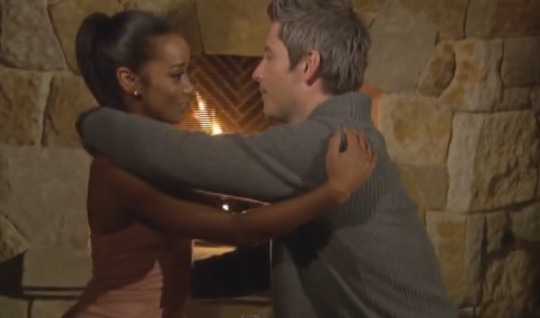
Photo: ABC
As the night wears on, Bibiana — who was already irritable when the party began — grows ever more frustrated as woman after woman grabs Arie before she can. That is, if she’s even trying — we only ever see her sulking on the couch.

Photo: ABC
“I’m done,” she says with a pout, before stomping out of the room and slamming the door. Meanwhile…
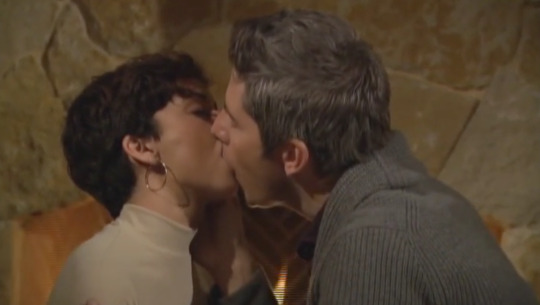
Photo: ABC
“It was, like, really hot,” reports Bekah of her first smooch with the Kissing Bandit. Not hot enough, toots: Seinne gets the date rose!

Photo: ABC
Seinne is in it to win it, dawg.
Cocktail party time! Arie — who either is a true gentleman or just knows how to approximate one, I can’t decide — kicks off the night by seeking out Brittany T., to make sure she feels better after her demolition derby-related injury. She does, especially after the Bachelor gives her this:
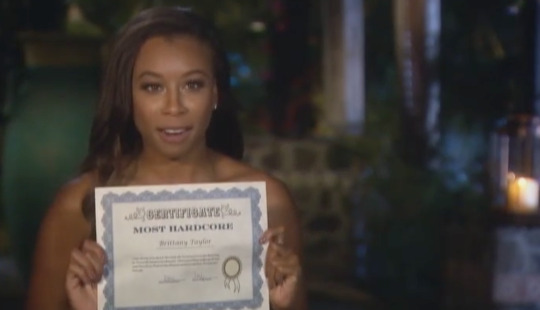
Photo: ABC
We interrupt this recap to remind you that fur is gross, folks. Here’s hoping Bekah the nanny’s coat is faux.

Photo: ABC
“I lead with chemistry, and with Bekah, there’s a lot of that,” says Captain Obvious. “She’s bold and charismatic, and when we kiss, it was just apparent that she could be the whole package.” The whole package minus about 10 years, but why quibble?
After an intern surgically removes Arie from Bekah’s face, he gets accosted by Krystal, who feels it’s necessary to “follow up” with the Bachelor even though she already has a rose. As you can imagine, this does not go over well.
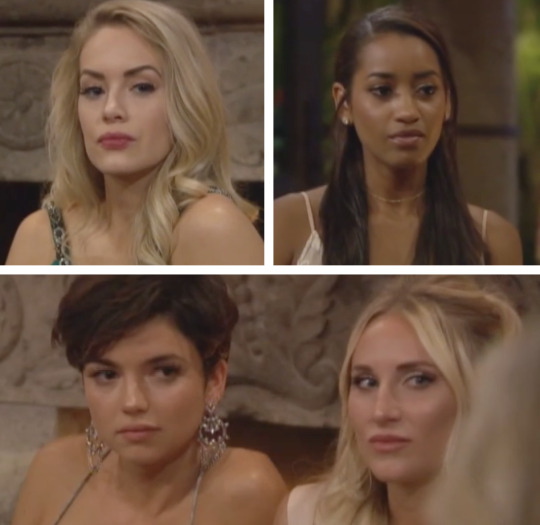
Photos: ABC
“I’m not worried,” breathes Krystal in her hyperventilating baby voice. “Some girls are a little weird, and some are very young, and some girls aren’t even there yet.” Which may be why she thinks it’s ok to interrupt Arie again while he’s talking to Bibiana, and you just know Bibi Gun is not about to lose her time tonight.
Krystal: “Do you mind if I step in for a moment?” Bibiana: “I actually do.”
The tension carries over into the house when Krystal foolishly (or as a calculated manipulation) comes and sits next to Bibiana. “I really think that you have a lot of balls just coming to sit down with us,” growls Bibi. “When you learn to speak to me like a normal human being and not with a fake tone, then I can actually respect you.” Then she does a dramatic interpretation of Krystal’s annoying personality.
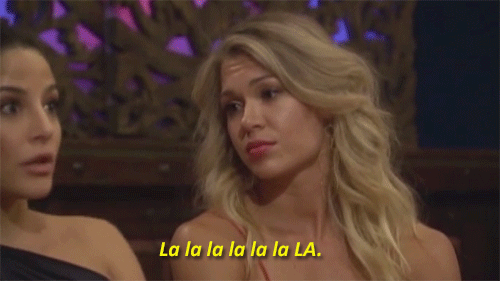
Photo: ABC
When Krystal tries to protest that she was just “checking on” Bibiana, Miss Miami puts a stop to that real quick. “Baby girl, it’s not about checking. If I’m trying to talk to my man, you need to back the f**k up.” Naturally, Team Bachelor makes them stand next to each other at the rose ceremony.

Photo: ABC
Fortunately for Krystal, Bibiana — who warned that Krystal would have to “sleep with one eye open” if she got sent home — gets a rose. She joins Maquel, Jacqueline, Bekah M., Jenna, Chelsea, Lauren S., Raven 2, Annaliese, Lauren B., Kendall, Brittany, Ashley, Marikh, Caroline, Becca, Seinne and Krystal in the winners’ circle. That means we must say goodbye to Lauren G. (2 down, 2 to go!), Valerie, and Jenny… who takes it the hardest.

Photo: ABC
Ever the gentleman (or a jerk capable of impersonating a gentleman, I’m not sure), Arie goes after Jenny to comfort her in her time of nationally televised rejection. “I have to make tough choices,” he says. “And I just didn’t see it.” And Jenny’s all, Whatever, Old Man River. “I’m not sad about you,” she sniffs. “I’m sad about leaving my new friends.” Indeed, Jenny has never experienced rejection before, and she definitely does not enjoy it. “He literally picked a taxidermist over me,” she moans. “I just feel like I embarrassed myself.” Finally, Jenny and I agree on something.
And with that, rose lovers, we’re done with week two. (The “next week on” preview can be summed up in one word: Tears.) So tell me, do you think Arie’s a true gentleman or just playing one on TV? Does anyone else feel guilty about hating Krystal, given her tough upbringing? And why in the world would anyone ever want a pickled bat? Post your thoughts now! And be sure to check out Chris Harrison’s exclusive blog right here. Now if you’ll excuse me, I’m going to go get examined for whiplash… just in case.
The Bachelor airs Mondays at 8 p.m. on ABC.
Read more from Yahoo Entertainment:
Ewan McGregor grilled backstage at Golden Globes about potential ‘Star Wars’ return
‘Bachelor Winter Games’ first look: A hot mess in the ice cold
2018 preview: The 50 movies we’re most excited to see
#_revsp:wp.yahoo.tv.us#recaps#_draft:true#the bachelor#_author:Kristen Baldwin#_uuid:06514bb9-aa3b-3517-a5f2-b6974f368db2#_category:yct:001000086#_lmsid:a0Vd000000AE7lXEAT
6 notes
·
View notes
Text
Mr. Poppeacock is much like Scrooge in many ways. He's rich, he's a jerk, he loves his fam even if he's kinda poor at showing it in healthy ways. But most of all, he and Scrooge grew up poor, in northern Britain, and travelled to America to make his fortune. Which he did, slowly but surely. Mr. Poppeacock hails from Lancashire, son of Yorkshire parents. He was often mistaken for Scottish in America until he realized as a young man that people tend to LISTEN if you sound... proper. Posh. Noble. Apprenticing for a tailor from Oxford he learned the accent well enough that he forsook his original accent entirely to the point that it's now almost entirely his real accent. It's served him well, fooling many an employer and potential client that he was something he wasn't: an educated boy from the English countryside, hailing from noble estates that, well, Durand was certain was TOTALLY a lie. Mostly. Maybe. Look there's nobility somewhere, just trust him. With an eye for color, color scheming, and just plain scheming, he proved himself a ruthless businessman. He had few qualms in shoving out competitors and sometimes underhandedly making sure HIS clothing would be shown in these newfangled moving pictures. But while ruthless, he established the Poppeacock name as not only formidable, but a name that meant persistence and dogged determination. If Durand had any natural advantage, it was being able to out-work everyone else like an energizer bunny, working days straight without rest and seemingly no ill side-effects with every attention still given to detail. After all, the only person he was ever harder on than his own employees was himself. This was especially true in other areas as well. Certain in his sexuality and with little to no ability for introdpection, it would take him years and years to finally realize how absolutely, utterly gay he was--coming too late to save his marriage with another woman who'd fallen in love with the dashing, athletic young man and whom he'd admired for loving him and mistaken it for loving her. They never divorced, as was not the practice of the time and would have no doubt caused scandal, but moreso they did not want to harm their young daughter's development. So friends they stayed, his wife having a relationship with other women, and he having flings with other men, until a cancer took her after their daughter was grown. Death would travel frequently with him from then on. He loved his daughter more than his own life and the same went for his new little grandson, however much he disapproved of his daughter's wild, somewhat suspicious husband who'd grown up on the streets of London. Their affair was on most newspapers, including the newspaper that covered his daughter's untimely demise in a car accident and his son-in-law's eventual imprisonment. Durand never had time to grieve his daughter, then his mother and sister, with a young, cooing, happy boy to take care of now and frankly, he didn't care and twenty years on still doesn't care. Durand has business to take care of; somehow, there is always something more important to take care of. He would say he is well-adjusted, but anyone who knows anything, knows better than to ever, EVER bring up his daughter. For your own sake, but mostly, his. His and his somewhat strained grip on reality regarding the subject. You will find no pictures of Estella Poppeacock in his home; don't ask for them. With so much death around him, Mr. Poppeacock clings to the sparkling star that pushes him on despite a... worrying propensity for taking too many sleeping pills and too much wine: his grandson, Nizar. Nizar is Mr. Poppeacock's greatest joy and with his daughter's proverbial ghost hanging over both of them, undoubtedly to be his greatest sorrow. Clinging to Nizar, the little fashion mogul has begun to push him away. Nizar yearns for freedom and independence that his grandfather is loathe to give him for fear that such independence will take Nizar from him, just as it did his mother. Nizar dreads that he might have to take his freedom one day because he knows his grandfather would give it to him, and that this would eventually kill his poor grandfather whose entire world encompasses his grandson. And as much as Nizar complains, at heart, he loves his little grandfather who's raised him with so much love. Mr. Poppeacock, founder of Poppeacock Incorporated, head of the Poppeacock family and fashion icon, is many things. He is a street rat who clawed his way into the upper echelons with poison in his words and daggers in his eyes. He is an LGBT advocate and then member at a time when being so could get you beaten. He is a man who loves his family too fiercely to give any love at all to anyone else. He crushes oppnents under his claws but fear so dictates nearly every decision and strangles him so tightly his soul has long withered. He is a strange little man so vain he would eschew gender simply to be the biggest, most flamboyant center of attention possible. He is Mr. Poppeacock, the gay little peacock so desperate for love and so utterly, blisteringly unable to love himself.
#Mr. Poppeacock#woo that got long#longer than I meant#oh well#have some stuff about my terrible little man
29 notes
·
View notes